Essential Guides
Ocean Mapping
New to Yachting

Yacht Captain jobs
Your new adventure awaits.

Photo of Captain Sally-Ann Konigkramer
Explore more yacht roles
Other essential guides.

Mandatory certificates

What you need to know about B1/B2 visa

Download yacht crew CV templates

How to write a memorable yachting CV

How to prepare for a yacht interview?

What are the two main yachting seasons?

Big yacht crew hubs you should know about

Is yachting the right choice for me?

Yacht crew salary guide
Leading from the helm as a Captain is undoubtedly one of the most fulfilling and rewarding career paths in the superyacht industry.
The Captain holds the most senior position onboard a yacht and the one responsible for the overall operation of the yacht, the safety of its crew, owners and guests. It’s an all-encompassing position where excellent navigational capabilities are coupled with a high level of administrative and managerial skills.
The role differs depending on the size of the yacht, its usage and its cruising itinerary. Captains on smaller yachts need to be hands-on problem solvers and multitaskers. Under 35m, for example, the Captain’s position also encompasses the role of an Engineer, whilst on larger yachts the Captain has dedicated teams and Heads of Departments under their command.
What does a yacht Captain do? | Yacht Captain Job Description
Commanding the yacht and navigating safe passages across the oceans is just a small part of a Captain’s job. A yacht Captain is also in control of overall safety, crew management, budgeting, administration, refit projects, voyage planning and adhering to all international maritime regulations (ISM, MARPOL, SOLAS).
The responsibilities of a yacht Captain include:
Safe navigation and operation of the yacht
Ensuring that the yacht is in all respects compliant with the relevant laws and regulations
Ensuring that the yacht is prepared for annual flag surveys, annual class surveys and port/flag state controls
The setting of budgets and budget management
Hiring, leading, appraising and dismissal of crew
Overseeing the maintenance of the vessel
Ensuring legal and regulatory compliance
Managing yacht refits and surveys
Managing fuel costs and dockage fees
Being an ambassador for the yacht, hosting and entertaining guests as required
Voyage planning
Soft and hard skills required to be a yacht Captain
Successful Captains are excellent leaders, able to set a common goal for their crew and able to communicate with owners, guests, crew, contractors and brokers alike.
The skills of a successful yacht Captain include:
Excellent leadership, management and diplomacy skills
Excellent yacht handling and navigation
Ability to stay calm in difficult situations
Good grasp of finance and legislation
Excellent communication and interpersonal skills
Organisation and administration skills
How to become a yacht Captain?
Maritime training and sea-going experience is required. Positions are qualification based, from a Master 200, Master 500, Master 3000 and up to a Captain Unlimited. Training may be completed in a National Maritime Academy, a university or a specialised Sailing School.
Mandatory certificates needed to work on board a yacht
All crew members regardless of position and seniority need to have a valid STCW Basic Safety Training certificate, along with a recognised Seafarers medical certificate, the most popular being the ENG1 which is issued by an MCA (Maritime and Coastguard Agency) professional medic.
Without these two certificates, it is not possible for crew to work on board a yacht and a Recruiter will not be able to assist you in finding work onboard a yacht. For more information about mandatory certificates please visit our Mandatory Certificates Guide .
Are you ready to secure a Captain position on board a yacht?
Become a member of YPI CREW and connect with our recruiters so they can guide you through your job search.
Each of our recruiters is specialised in crew placement for a particular department and they will do their best to get you an interview on board a yacht. They will also advise you on how to best present your experience and skills and prepare for a yacht job interview.
YPI CREW TEAM
Ypi crew recruiters in charge of captain recruitment.

Ulrica Lindström
Head of Captain and Officer Department

Captain and Officer Recruitment Specialist

Caitlin Sorrell
Let’s get started. call us on +33 (0)4 92 90 46 10 or email us., our mission, vision and values, mlc 2006 compliance, essential guides, yacht crew positions.
Chief Officer
Second Officer
Third Officer
Chief Engineer
Interior Crew
Head of Service
Head of Housekeeping
Specialist Positions
Spa Manager
Spa Therapist
Personal Trainer & Yoga Instructor
Hairdresser
Mandatory Certificates
B1/b2 visa information, how to write a memorable cv, how to prepare for an interview, yachting seasons, yacht crew salary guide, is yachting the right choice for me, cv templates, ocean mapping, new to yachting.
+33 (0)4 92 90 46 10
- Brokerage New Construction How to Buy How to Sell
- Yacht Fleet Yacht Catalog Charter Marketing Destination Guides
- Financial Services Payroll & Accounting Payroll Service Process Logistical Support Admin Services Crew Admin
- Job Descriptions Crew FAQ
- About Sitemap
How Much Does a Yacht Captain Make?
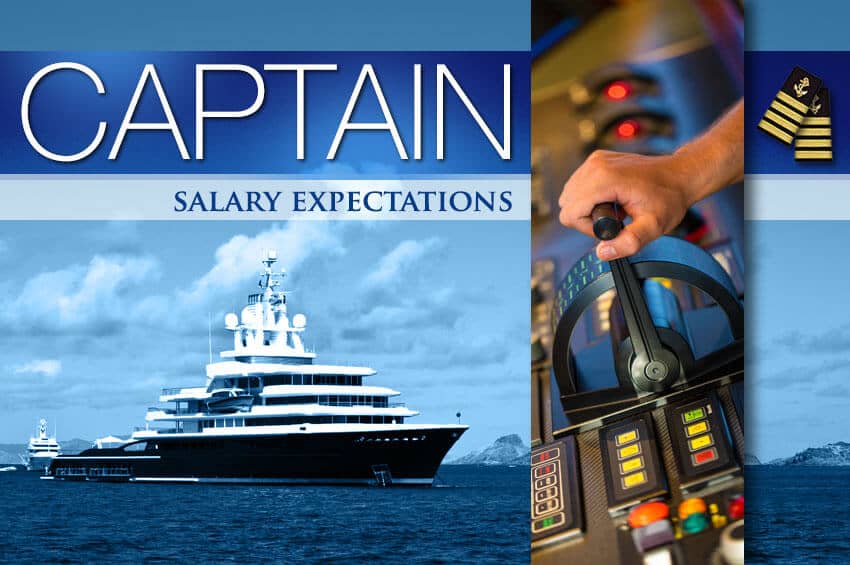
Captains of luxury yachts command a base salary well into six figures. Dependent on the length of the vessel, tenure of experience, and level of licensing yacht captain salaries range from $48,000 to over $300,000.
As the length of yachts increases, the complexity of the position of captain escalates. Although the job of yacht captain is often portrayed as one of luxury and leisure, it is a career choice of vast responsibility. While the exact details of a job description vary from program to program, the captain is the CEO of a small corporation. He/she reports to the Chairman of the Board - the yacht owner.
The Luxury Yacht Group webpage presents salary guidelines. Variation within the ranges reflect license level, experience and longevity of the captain 1 .
| Senior Master | 170 ft – 200 ft + | $144,000 - $300,000 |
| Captain | 100 ft – 170 ft | $84,000 - $180,000 |
| Junior Captain | 60 ft – 100 ft | $48,000 - $98,000 |
Additional parts of the salary package include bonuses, health insurance, flight expenses, paid vacation, training and certification cost reimbursement, and uniforms. Because the position requires residency aboard the vessel 24/7 all food and sundries are routinely supplied to crew. If the yacht is available for charter, the captain will also earn tips from charter guests. The industry is unique and each vessel in it has individual programs.
An average mega yacht with 12 crew has operating expenses between four and ten million dollars. The budget is based on where the yacht is moored, whether it is available for charter, and its travel destinations. On some yachts, a management company or a part of the owner’s business network handles accounting and makes financial decisions. On other yachts, the captain manages all aspects of the budget, chooses what charters to take and where to station the boat between charters, when and where to have yard work, and all personnel decisions.
A basic list of captain job responsibilities includes:
- Ultimate safety for passengers, crew, environment & vessel
- Achieving owner’s objectives?
- Crew hiring and dismissal?
- Personnel management?
- Shipyard/project management?
- Legal and regulatory compliance?
- Navigation?
Ultimate safety
The Captain holds the life of all aboard in his hands. He is also held accountable for the yacht itself and the environment. He must understand the mechanics of the boat, all electronic tools aboard, international regulatory requirements, and rules of the flag state.
Achieving owner’s objectives
Owner objectives are broad ranging. The captain is the mouthpiece for the interests of the owner. He holds the responsibility to reach outcomes which benefit the owner. The owner may simply require the captain to provide luxury service when he (she) is aboard. Some owners regularly use the vessel with family and guests, others may be aboard only occasionally. Charter periods for the vessel also factor into the objectives of the owner.
Crew hiring and dismissal
The requirements of the Marine Labor Convention (MLC) for contracting, dismissing, and managing are explicit and require strict adherence. Throughout any hiring or dismissal, the safety of the vessel and owner as well as issues of confidentiality must be assured by the captain. Identifying the best employees for the program involve a balance of certification, experience and personality.
Personnel management
Managing between 12 and 40 regular crew members aboard a mega/superyacht, day workers and seasonal hires is routine. From dive master, to stewardess, chef, and ETO, the captain must have a working knowledge of the positions and set expectations for performance. In a multi-cultural environment (both guests and crew), the example the captain sets for work ethic, responsibility, and communication optimizes yacht operations. The challenge is complicated by the close quarters of crew accommodations and the group working/living together 24/7.
Shipyard/project management
The Captain oversees issues of time and costs for routine maintenance and vessel upgrades. Knowledge of register and flag requirements are tools the captain uses to define the project, obtain quotes, and supervise the work.
Legal and regulatory
The maritime industry is dynamic. In addition to the flag state and regulatory requirements mentioned above, the captain must remain current with all Maritime Guidance Notices (MGN), Maritime Information Notes (MIN), amendments to all international marine safety codes, and product notices. A knowledge of the global differences in regulations, enforcement agencies and regional mores is critical.
Each vessel has a different business model. At a minimum, the captain is responsible for budget oversight and financial record keeping. If the owner engages a management company, the captain is the interface between the yacht and that organization.
The classic definition of a captain’s job is that of a navigator. Safely plotting a course, following the course, docking and departing from berths are all fundamental vessel handling skills. A seasoned captain has personal familiarity of cruising geographies. Despite the importance and skills required, a small percentage of a captain’s time is dedicated to task.
How does that list of responsibilities distill into the profile of a captain? It takes decades of training, hours logged, certification, and experience to reach the level of performance required to captain a mega/super yacht. In addition to each of those quantifiable requirements, elements of character and temperament differentiate captains.
- Calm and charismatic personality?
- Superior leadership, communication, management and diplomacy skills?
- Excellent boat handling and navigational skills?
- Excellent ISM and ISPS knowledge and practices?
- Excellent maintenance, engineering and technical / troubleshooting experience?
- Ability to remain calm and give directions in an emergency situation?
- Organized and methodical?
- Financial management, business acumen, management skills?
- Languages and cultural sensitivity
- Extensive maritime licensing
Leadership of the crew involves training, coaching and refereeing. When a captain steps into the position of leadership on a large vessel, it is understood that he has ten years (minimum) of increasing responsibility. Training and education were used during that decade to resolve situations without damage to vessel, harm of the environment, or human injury.
As manager and protector of the owner’s investment, the captain negotiates for goods and services. When issues arise, it is the captain who develops options and makes recommendations. Using the comparison to a traditional business, the CEO (captain) and the President of the Board (owner) interface on strategic decisions.
The mega yacht captain is more than just an asset manager. The captain implements owner preferences in order to assure him the best yachting experience. Once an owner has determined the style of yacht he wants to own - how, when, where they want to use vessel - costs of operating and budget generalities are defined. The ultimate goal of captain and crew is the happiness of the owner(s) and their guests. Crew is the primary factor in the owner/guest experience and in a successful program. The captain fully understands and manages the limitations of vessel and crew.
As vessels increased in length, machinery and electronics increased in complexity. In parallel with those changes, regulatory agencies and flag states requirements escalated. The requirements of International Safety Management Code (ISM) and International Ship and Port Security Code (ISPS) reflect the challenges of operating a mega yacht. The captain holds responsibility for implementing all requirements aboard and remaining current with the changes made to respond to new issues within the industry.
During the last decade, the number of superyacht hulls nearly doubled. Based on the 2010 Global Order Book, the superyacht industry managed to grow even during the financial crisis of 2008. The Knight Frank Wealth Report (2016) for the decade concluded that the wealth required to maintain a yacht appears impervious to economic cycles. It does project a slight worldwide slowing of the number of ultra-high-networth individuals during the upcoming decade.
How does that economic data translate into job opportunity for yacht captains who have followed the established career path? How resilient is the opportunity during periods like the global downturn experienced in 2008?
Marcy Laturno, Director of Crew Placement & Charter Specialist at Luxury Yacht Group answered:
A long-term mega yacht captain added:
Securing a position as captain aboard mega and super yachts is competitive. Although new builds are released every year, each year there are additional individuals who have established professional credentialing and adequate experience aboard. Professional captains seek positions where they can assemble a stable crew, build longevity and establish a relationship with the yacht owner.
The position of mega/super yacht captain commands a salary which reflects the level of responsibility and the years of personal and professional development. A relatively small number of positions creates a competitive job market where longevity and experience are rewarded.
- Luxury Yacht Group website

Engineering License Changes
The MCA has restructured the engineering certifications. The MEOL course has been done away with, and the AEC course made mandatory and more thorough. Luxury Yacht Group explains all these changes, what engineers progressing through the ranks can do now, and how Y ticket holders can convert their licenses over to the structure.
14 Mar 2018
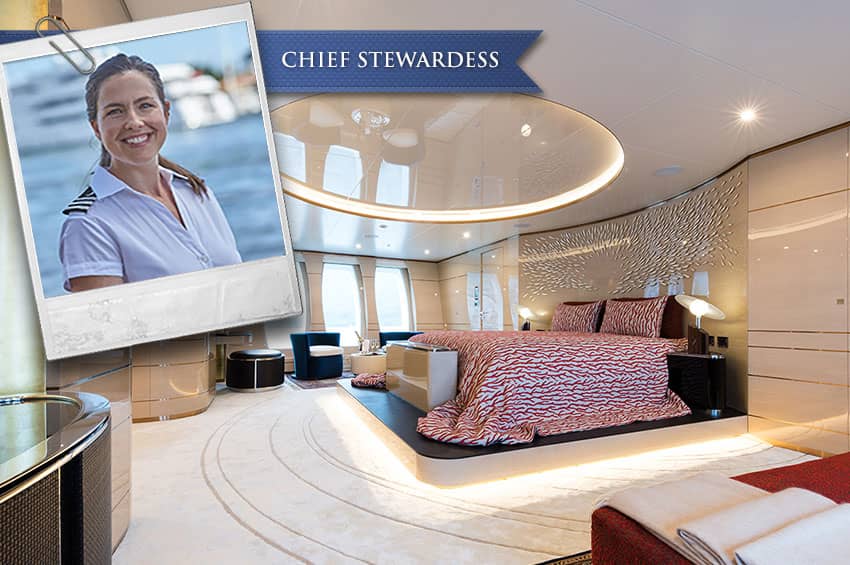
A Day in the Life Series – Chief Stewardess
For a yacht to run smoothly, it requires many working parts, and the interior department is a large component of this. The chief stewardess oversees this department and makes sure all the stewardesses onboard know what their tasks and responsibilities are. The interior department is largely in charge of the guest services whilst they are onboard, and responsible for interior maintenance of the yacht when they are not.
18 Dec 2017
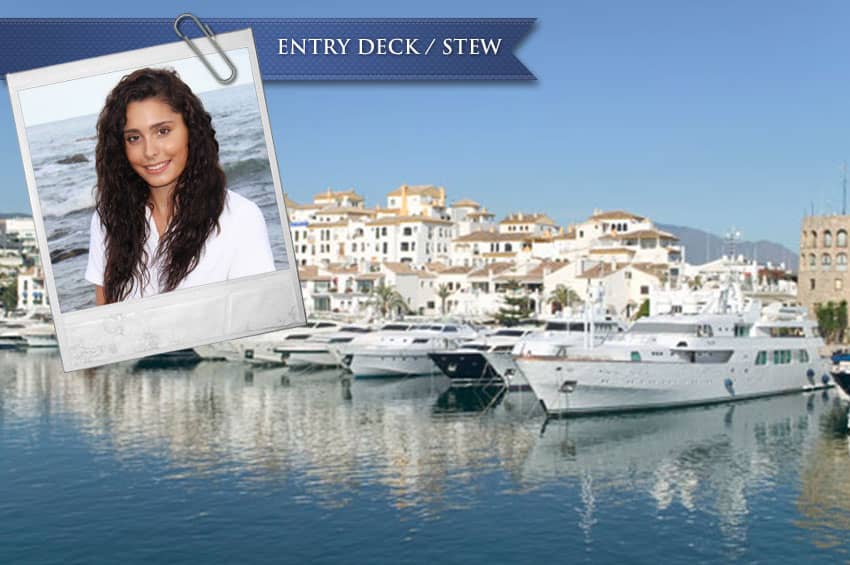
A Day in the Life Of Series - Entry Stewardess
Joining the yachting industry is an exciting and daunting undertaking. In this two part interview we speak with Melanie about why she decided to join the superyacht industry, what her hopes and goals are, and what she has learnt so far as an entry level stewardess.
29 Nov 2017

How to Become a Yacht Captain- An Expert’s Handbook
Do you want to become a yacht captain? Having watched my husband climb the ranks over the past 12 years, I have first-hand experience of seeing what it takes to become a yacht captain.
We started working on a small catamaran in the Seychelles, and today, he is the successful Captain of a world-traveling 50m super yacht.
Becoming a yacht Captain requires a significant investment of time and money, but the reward of commanding your own vessel and crew is immeasurable.
Let’s explore what it takes, including the salaries, necessary skills, and certifications.
Table of Contents
Job Description of a Yacht Captain
The Captain of a superyacht is responsible for the safe navigation of the vessel, the safety of the crew onboard, as well as protecting the environment.
They are the primary source of communication with the yacht owner, guests, and management company.
They also handle all the daily operations of the yacht, including crew management and safety training. The Captain deals directly with management companies, port control, maritime legislation, budgets, accounting, and human resources.

Yacht Captain Salary
The below super yacht Captain salary guideline is based on my personal research using an average of over 10 major yachting platforms:
- 20m-30m: $4000-$7500 p/m
- 30m-40m: $5500-$9500 p/m
- 40m-50m: $8000-$15000 p/m
- 50m-70m: $13000-$19000 p/m
- 70m+: $16500+ p/m
Additionally, with longevity a yacht Captain can also expect to see discretionary annual raises and bonuses.
If they work on a Charter Yacht there will also be charter tips received averaging $2500-$5000 per week of chartering.

Roles and Responsibilities of a Yacht Captain
The job of a Yacht Captain can be compared to that of a CEO, CFO, and COO of a large corporation. The responsibilities are huge.
On a smaller vessel of 35m or less, the captain will need to be more hands-on, and they will likely also be the engineer of the vessel.
However, as the vessel size increases, you will have larger teams and heads of departments to assist in delegating tasks.
Roles and Responsibilities
- Crew Management and training
- Hiring and dismissals of crew
- Human resources
- Accounting and budgeting
- Safe navigation of the vessel
- Safe navigational planning
- Marine and environmental protection
- Vessel maintenance – planning yard work and refits
- Owner and guest liaison
- Planning of guest trips and itineraries
- Ensuring the yacht is compliant with maritime law
- Ensuring the yacht is compliant with all flag state safety regulations
Soft and Hard Skills
When it comes to the question of how to become a yacht captain, besides the required licenses, it is essential to hold certain soft and hard skills:
- Strong leadership skills
- Team management
- A quick thinker and problem solver
- Calm under pressure
- Exceptional communication skills
- Diplomatic in decision-making
- Excellent boat handling skills
- Navigational skills
- Administrative skills
- Organizational skills
- Computer literate
- Strong understanding of maritime legislation

Mandatory Certifications for How to Become Yacht Captain
The license required when identifying how to become a Yacht Captain is dependent on the size/tonnage of the vessel they wish to drive.
Your entry-level Captain license is the Yacht-Master 200 ton. This allows you to drive a vessel of under 200 tons, which is approximately 35m/100ft.
From there, with enough sea time and experience, you can move up towards the Master 500 and then Master 3000 tickets.
If you were to start from scratch, you would first want to look at how to become a deckhand . This will give you all the information and guidance you require before you get to the point when you are ready to start your master’s licenses.
Here is the order in which you would complete your courses:
- ENG1 Medical
- Efficient Deckhand (EDH)
- Yacht-Master Offshore (200ton)
- Yacht-Master Ocean (200 ton)
- OOW (Officer of the Watch)
- Chief Mate 3000
- Master 500 ton
- Master 3000 ton
Yacht Master Offshore 200 ton Limited
Holders of this certificate can Captain a yacht up to 200 gross tons and must be within 150 nm from a safe haven whilst doing so. This course is also required to legally stand watch on a vessel of up to 500gt.
The course consists of theory and practical work and takes 13 days to complete.
Pre-requisites for Yacht Master 200t Limited:
- 3,000 nautical miles while cruising at sea
- 50 days at sea as an active crew member
- 5 days as skipper on vessels less than 24m LOA
- 48 hours on watch at night underway as an active member of a yacht’s crew. During at least six hours of this nighttime experience, the candidate must have acted as the vessel’s captain or watch leader.
- A GMDSS-compliant Marine Radio Operator’s Certificate such as the RYA Short Range Certificate or higher
- All qualifying sea time must be within 10 years prior to the exam

Master of Yachts 200 ton Ocean Unlimited
This certificate allows the holder to be in charge of a commercial yacht of up to 200 gross tons on unlimited voyages.
This comprehensive six-day course on celestial navigation is designed to equip future yacht Captains with the knowledge necessary to navigate the globe using a sextant and air navigation tables.
Additionally, it will enable them to plan, undertake, and manage an ocean passage with confidence.
Pre-requisites for the Master 200 ton Unlimited:
- Before enrolling in the course, candidates must have completed two voyages of 250 miles each or one voyage of 500 miles. The majority of the journey must take place out of sight of land, which means being at least 20 miles away from the shoreline.
- For the qualifying voyage, it is expected to create a passage plan that can be reviewed during the course.
Officer of the Watch (OOW)
In order to obtain the MCA Officer of the Watch (Yachts Less Than 3000 GT) Certificate of Competency, candidates must complete seven distinct modules. These modules are designed to prepare candidates for the MCA oral exam.
Pre-requisites for the OOW:
- IYT Master of Yachts Limited certificate
- A minimum of 250 days of actual sea service
- 115 days can be either sea service, stand-by-service or yard service
- A Completed MCA approved training record book
The 7 modules include:
- Navigation and Radar (15 days)
- General Ships Knowledge GSK (5 days)
- Proficiency in Survival Crafts and Rescue Boats/Advanced Sea Survival (3 days)
- Human Elements and Leadership Management HELM (3 days)
- Global Maritime Distress and Safety Systems (GMDSS)
- Efficient Deckhand EDH (5 days)
- Electronic Chart Display and Information ECDIS (5 days)
- MCA OOW Deck Oral Prep Work (12 days)

Chief Mate 3000GT
After obtaining the Officer of the Watch certification for yachts less than 3000gt, you can apply to the MCA for the endorsement of the Chief Mate (Yachts less than 3000gt) Certificate of Competency. It is possible to apply for both certifications at the same time.
Course Modules include:
- STCW Advanced Fire Fighting (4 days)
- Proficiency in Medical First Aid (4 days)
- Human Elements of Leadership Management – Management level (4 days)
Master of Yachts (500GT)
This certificate is required in order to Captain a yacht of up to 500 gross tons.
Requirements for the course:
- 12 months as a watch-keeping officer with an OOW Certificate
- A valid ENG1
Modules include:
- Stability (5 days)
- Business and Law (5 days)
- Navigation and Radar with ARPA Simulator (10 days)
- Seamanship and Meteorology (5 days)
- Celestial Navigation Refresher and Exam (5 days)
- Proficiency for persons in charge of medical care onboard a ship (4 days)
Master of Yachts (3000GT)
This certificate is required in order to Captain a yacht of up to 3000 gross tons.
The modules for the Master 3000GT are the same as that of the Master 500. If you pass all the modules and have met the requirements for the Master 3000GT, you can skip the Master 500gt Course and do the exam and oral for the Master 3000GT.
Requirements include:
- including not less than 240 days watch-keeping service whilst holding an accepted OOW Certificate of Competency (CoC).
- All of this service must be completed in vessels of 15m or over in load line length and include 12 months in vessels of 24 m or over in load line length, or 6 months in vessels of 500gt or more.
- A valid ENG1 Certificate
Final thoughts
Most crew don’t anticipate the significant amount of time and money it takes when wondering how to become a yacht Captain.
My advice to you is to start logging your sea time from the very beginning and plan ahead. You don’t want to miss out on opportunities due to not having the required license.
If you are still looking for more detailed information or if you are looking to book a course, head over to the PYT website. They are an MCA compliant training facility with schools in Fort Lauderdale and South Africa.
Good luck on your journey. I hope to see you out in the big blue ocean commanding your own vessel one day.

Hi, my name is Lisa, a Chief Stewardess in the yachting industry with 10 years of experience, as well as 8 years of hospitality experience prior to that. Being in the yachting industry has been a whirlwind of adventure, growth, challenges and some of the best experiences of my life, and I am excited to share my knowledge and experiences with all of you.

Do you operate a yacht? Our app is perfect for you
How to become a yacht captain - certifications & experience.
Just like any other highly paid and highly specialized position, becoming a yacht captain is a long grind. Nothing is given to you. You have to start from the bottom and work your way up. It is a process that takes many years of sea time, education, and experience.
Assuming that you are relatively new to the industry, it’s best to start from the very beginning. In the following chapters we will go through a detailed breakdown of the certifications and qualifications you need, and show you how to become a yacht captain.
Table of contents
How to become a yacht captain - Basic education
Rya certification, creating your resume, get to a yachting capital.
- "Earning" your first job
- Get experience & continue your education
Climbing the ranks
Becoming a yacht captain, responsibilities of a yacht captain, yacht captain salary, final notes on how to become a yacht captain.
.jpeg)
Before you get your first job onboard of any yacht, there are a few courses you need to take. These are mandatory for everyone who wishes to work onboard, and are commonly known as basic training for seaman:
- STCW 2010 Basic Safety Training (BST) - This training consists of first-aid practices, response to emergencies, personal safety, social responsibility, and best practices for sea survival. The duration of this course is 5 days and pricing starts at $1012.
- Efficient Deck Hand (EDH) course) - This course teaches basic seamanship, rope and wirework, painting and maintenance routines, as well as other safe working practices aboard. Much like the BST, this course is 5 days long and pricing starts at $964).
At this point, what you want to do is get your Royal Yachting Association (RYA) certificate. The Royal Yachting Association (RYA) is a recognized organization that issues your Powerboat Handling Level 2 (basic course), Yachtmaster™ Offshore , and Yachtmaster™ Ocean .
Note that the costs associated with the RYA certificate can vary, as you need to find an associated training center, purchase all the necessary materials, and abide by all the entry requirements. So you might need to do some research at this point.
Once you successfully complete the courses mentioned above, you will need to put your CV together. There are many templates you can use for this purpose. You can start by using this one .
Once your CV is created, you will need to seek out the best yacht crew agencies and start applying to all of them. This page gives a good overview of the most popular options.
Keep in mind that there are many options when it comes to resume templates and yacht crew agencies. It might be a good idea to use Google to find more options.
.jpeg)
To increase your odds of getting a job onboard, you will now need to get to one of the yachting capitals. This is, by far, one of the best tips for ambitious young sailors that want to know how to become a yacht captain.
Don’t get fooled by those who tell you of their single best yachting capital of the world. Depending on your current location and budget, you will have several options. Check this article to start your research.
“Earning” your first job
As soon as you arrive at your yachting capital of preference, you will need to get a job. Similar to any other industry, this usually happens by actively seeking out open positions. For yachting work, this is done through “dock walking”, a term that refers to the process of going from boat to boat, searching for opportunities.
What you want to do here is be pleasant, hand out your CV, grow your network, and offering any kind of service. There might be owners that need help with buffing, sanding, polishing, scrubbing decks… you name it! Take any job that you can because each hour you spend onboard improves your resume.
After a while, you will hopefully manage to get a job aboard a (super)yacht. This is where you want to be. It is important to manage your expectations and prepare to work very hard. Your first job will not be glamorous and it will certainly not be a “working holiday”. You will be living in a cramped scape, away from home, doing chores most hours of the day.
Don’t let the day-to-day tasks discourage you. Everything you do at this point helps you build character and shows that your position is “earned”. You will have many opportunities to gain experience, overdeliver, and start climbing the ladder.
Gain experience & continue your education
As you become more experienced and collect enough hours onboard, you will qualify for a few more courses, which are issued by the Maritime and Coastguard Agency (MCA).
- Officer Of the Watch (OOW) - This course allows you to become an officer on board a vessel up to 3000gt. In order to apply for this course, you will need to meet several requirements, including >250 days onboard, holding an RYA certificate for at least 36 months, and having completed an MCA training record book . The latest is a list of tasks that you need to complete while serving onboard a vessel that exceeds 15 meters in length. Anything smaller is not qualified as valid experience according to the MCA. The modules of OOW include:
- General Ship Knowledge (GSK) - Price between $1000 - $1100
- Navigation & Radar (ARPA operation) - Price upon request
- Global communications training (GMDSS GOC) - Price starting at $1625
- HELM Training Operational Level - Price upon request
- Proficiency in survival cross & rescue boats - Price between $860 - $900
- Electronic Chart Display Information System (ECDIS) Training - Price between $1300 - $1800
Each of the modules, once completed, requires a written exam. This means that you need to find a partner organization where you can go and write the exam. If you pass, the certificate will be sent to your location (including a digital copy that you can add to your resume).
You need to pass all of the modules in order for the MCA to issue your certificate of competence (COC). And as soon as all that is done, you are officially qualified to perform your oral exam for the OOW. Here is a video that shows you the steps you need to follow:
The exam itself consists of a discussion with a qualified instructor, where you go through all the modules through a series of questions. Upon passing the exam, and given that you hold all the aforementioned certificates, you will receive the MCA Yachts OOW certificate and are officially qualified to be a deck officer.
Keep in mind that the certificate itself doesn’t automatically guarantee you a promotion. You might move slightly up the ranks (lead deckhand) but you will still need to gain more experience in the form of additional sea time.
More specifically, you can continue with higher-level education once you gain even more experience on board.
The course you want to do is known as MCA Master 500 yachts . You can do this once your certificate of competence has been issued for OOW and 12 months have passed. You will also need to have an additional 120 days of verified sea service.
The course consists of several master modules, which include:
- Ship Stability - Price: $1500
- Business and Law - Price: $1500
- Navigation, ARPA, and radar simulator - Price: $3350
- Seamanship & Meteorology - Price: $1500
The course also includes some ancillary course modules, as well as the requirements you need to abide by in further detail. Similar to the OOW, you will need to pass a written certificate for each of the modules, in order to proceed to an oral exam to receive your Master 500 certificate of competence (COC).
You now have all the necessary qualifications - there are no more modules. However, you still need to perform an additional 12 months of sea time, and 120 days of sea service.
The final step is getting your MCA Master 3000 certification, a process that consists of an oral exam only. You can find more information about the requirements and components here . The oral prep course for this exam is highly recommended, takes 5 days, and costs between $890 and $1160, depending on the number of students that choose to participate.
Those who have little to no experience tend to think that a captain’s only responsibility is to command the ship. The truth is much “broader”. A yacht captain’s responsibilities are divided into three areas:
- To ensure the safety of life of everyone onboard
- To ensure the safety of the vessel (paperwork, unforeseen circumstances, etc.)
- To ensure the safety of the marine environment
This may sound rather simple, but remember that there are many subcategories that fall under these responsibilities:
- Ensuring the crew is well-trained, rested, and qualified to do their job, all while remaining safe. This requires strong (cross-cultural) people skills and is probably the hardest part of the job.
- Make sure that all your personal certificates, as well as the vessel documentation, is in order.
- Staying up to date with yacht inspection, maintenance, and logging all the necessary information. You can completely automate this responsibility by using our software, PlanM8 .
- Make sure that the vessel is compliant with the International Safety Management code
- Navigation of the vessel
- Make sure the yacht owner (or guests) are satisfied.
The salary of a yacht captain depends on several factors, including the years of experience, the size of the vessel, and the duration of the contract. Generally speaking, the low end of the salary is approximately $5000 per month and the high end exceeds $18.000 per month. For more information, check this resource .
After reading all of the above you should have a better idea of how to become a yacht captain. There are many courses you need to complete and lots of personal sacrifice in the form of sea time. This is why only the most passionate ones - those willing to go the extra mile - will manage to get a hold of the helm.
Remember that in between each of your certifications it is important to get as much sea time as possible, doing everything in your power to learn from the master on board. Much like any traineeship, your primary concern should involve gaining lots of experience.
The discipline and character you build along your former years will help you understand the importance of continuous education. You will naturally want to familiarize yourself with the latest industry practices and improving your abilities.


Yacht Crew Positions and Salaries
The organisational structure onboard a superyacht follows a strong hierarchy based upon a military model. Exact job duties and lines of authority are set and strictly adhered to. This hierarchy is followed on the vast majority of yachts; however, responsibilities of the crew on smaller yachts are often merged.
There are four departments on yachts with clear organisational structure:
- Deck (including Bridge) – Safety, passage delivery, maintenance of the yacht's exterior, guest outdoor activities
- Engineering – Safety and smooth operational running of the yacht
- Interior – Housekeeping, guest wellbeing, activities, accounting
- Galley – Food preparation, stock control, hygiene, galley maintenance
The top of the hierarchy on each yacht is the Captain , who reports to the yacht owner either directly, or through a representative or a yacht management company.
Salaries vary and depend on the yacht size, use, type and location, as well as the experience and qualification of the crew member. We included typical salaries of crew based on the data available from reputable industry sources, as well as our research of over 60,000 crew registered with us.
Deck Positions
The primary duty of the Captain is the overall safe manning and operation of the yacht. Yacht Captain is responsible for the vessel, yacht crew, owner and guests, including personnel management, shipyard/project management, legal and regulatory compliance, accounting, achieving owners' objectives, and answers to the owner regarding all decisions.
| Captain | €4,000 - €15,000 |
First Mate / Chief Officer
The First Mate or Chief Officer is the right hand of the Captain. Takes command of the yacht from Captain when required. Shares Captain's responsibilities as required.
| Chief Officer | €3,000 - €13,500 |
| 2nd Officer | €3,000 - €8,000 |
| 3rd Officer | €2,500 - €6,000 |
| Security Officer | €3,000 - €5,000 |
Bosun / Lead Deckhand
Bosuns are usually experienced Deckhands with additional responsibilities. They are in charge of Deckhands onboard the yacht and often spend a lot of time with guests during outdoor activities. The Bosun is normally the main tender driver.
| Mate | €2,500 - €6,000 |
| Bosun | €2,500 - €5,500 |
| Lead Deckhand | €2,500 - €5,000 |
Responsible for the maintenance of the exterior of the yacht and keeping it in pristine condition at all times. Deckhands also assist in maintaining, cleaning and operating yacht's tenders.
| Junior Deckhand | €2,000 - €3,000 |
| Carpenter | €3,000 - €4,000 |
Engineering Positions
Chief engineer.
Responsible for the Engineering Department and for all technical aspects of the boat and its equipment. The Chief Engineer's duties include overseeing all mechanical and electrical operations, ensuring all planned maintenance takes place and liaising with subcontractors.
| Chief Engineer | €5,000 - €15,000 |
Second / Third Engineer
The Second and Third Engineers report directly to the Chief Engineer. They assist in maintaining all mechanical and electrical operations of the yacht.
| 2nd Engineer | €3,000 - €10,000 |
| 3rd Engineer | €2,500 - €6,500 |
| Sole Engineer | €3,500 - €12,000 |
| Motorman | €2,500 - €4,000 |
ETO / AV/IT Officer
Electro-Technical Officer (ETO) and AV/IT Officer are in charge of daily maintenance of all electronic, computer, audio/visual and communications equipment and their efficient operation. This includes the radio, radar, telephones, satellite communications, navigation systems, computers, Internet connection, interior equipment (TVs, sound systems), etc.
| ETO | €4,000 - €8,000 |
| AV/IT Officer | €4,000 - €7,000 |
Electrician
The Electrician is responsible for maintenance of all electrical circuits onboard the vessel, circuit breakers, switches, lighting, batteries, etc.
| Electrician | €4,000 - €6,500 |
This is an administrative position on large yachts. The Purser is responsible for all operations in the interior department, including inventory, purchasing, provisioning, accounting, organising guest activities, and assisting the Captain with the yachts paperwork.
| Purser | €5,000 - €9,000 |
Chief Steward(ess)
Duties are similar to those of other Steward(ess)es onboard the boat, but on a more senior level, including managing the interior department and training. Small yachts with less crew do not have a Purser. The Chief Steward(ess) is in charge of all the responsibilities normally carried out by the Purser on large yachts.
| Chief Steward(ess) | €4,500 - €8,500 |
| Interior Manager | €4,000 - €8,000 |
| Head of Servicer | €4,000 - €7,000 |
| Head Housekeeper | €3,000 - €5,500 |
| Spa Manager | €3,500 - €5,500 |
Steward(ess)
Steward's or Stewardess's main responsibility is to maintain the interior of the yacht and provide the highest standard of care to the owner and guests. They serve food and drinks, prepare guest activities, pack and unpack luggage and are on call for anything that the guests want anytime day or night. On some yachts, they help the deck crew moor the yacht.
| 2nd Steward(ess) | €3,000 - €6,500 |
| 3rd Steward(ess) | €2,500 - €4,000 |
| Spa Steward(ess) | €3,000 - €4,000 |
| Service Steward(ess) | €2,500 - €5,000 |
| Housekeeping Steward(ess) | €2,500 - €4,000 |
| Laundry Steward(ess) | €2,500 - €4,000 |
| Sole Steward(ess) | €3,000 - €6,000 |
| Junior Steward(ess) | €2,000 - €3,500 |
| Butler | €3,500 - €6,000 |
| Stew/Deck | €2,500 - €4,000 |
The Head/Executive Chef onboard a luxury superyacht is a culinary trained professional responsible for the overall management of the galley department on larger yachts, including guest and crew meals, provisioning, food safety, maintaining strict hygiene standards and financial/budgetary administration.
| Head Chef | €6,000 - €10,000 |
Assists the Head Chef in all aspects of galley duties. The Sous Chef may be required to independently provide crew meals or guest meals at the direction of the Head Chef.
| Sous Chef | €3,500 - €8,000 |
Crew Chef / Cook
Large yachts employ a separate crew and guest chef. The Crew chef provides meals for the crew.
| Crew Chef / Cook | €3,000 - €5,000 |
| Sole Chef | €3,500 - €9,000 |
| Stew / Cook | €2,000 - €4,500 |
Other Positions
Many yachts, especially the large ones, have several additional positions. These are often combined with primary roles, e.g. Stewardess / Masseuse or Deckhand / Dive Instructor . The most common are:
| Beautician | €3,000 - €4,000 |
| Hairdresser | €3,000 - €4,000 |
| Massage Therapist | €2,000 - €4,500 |
| Nurse | €3,000 - €4,500 |
| Dive Instructor | €3,000 - €6,000 |
Career Advice:
Email address:
Remember me Forgotten password?
Password Reset
Enter your email address and we will email you a password reset link.
Email address:

- Career Advice
- Salary Guide
- Dockwalk Presents
- Digital Dockwalk
How Much Does a Yacht Captain Earn?

Lauren Beck is the former editor of Dockwalk and was with the publication from 2006 to 2023. At 13, she left South Africa aboard a 34-foot sailing boat with her family and ended up in St. Maarten for six years. Before college, she worked as crew for a year, and then cut her journalistic teeth at Better Homes and Gardens and Ladies’ Home Journal online. She loves traveling, reading, tennis, and rooting for the Boston Red Sox.
Whether you are a captain on the lookout for new opportunities or a deckhand working your way up the career ladder, the Dockwalk Salary Survey is a helpful tool for knowing where you stand on pay. With the 2021 results now in, we find out how much yacht captains are earning around the world…
The Dockwalk Salary Survey
Our annual survey usually attracts the most responses from captains, and this year was no different with a total of 476 responses. Out of those, 336 shared their salary information. The average length of time those 476 captains have worked as captains was 14 years, with an average of 19 years spent in the industry. Most of the respondents — 89.3 percent to be precise — work on motor yachts and the vast majority — 76 percent — were based on private yachts.
It used to be that captains could count on approximately $1,000 per foot per year. But in reality, it's not so straightforward. As larger boats grow increasingly more complex, the requirements for a captain are generally much higher in terms of experience and licenses, and so captains on bigger vessels will naturally yield higher salaries.
But, as they say, size isn’t everything and the same applies when it comes to compensation. Other factors such as time in the industry, whether the boat is chartered, and if the position is rotational, are also considered. Longevity, for example, is another important factor that is likely to determine pay; some experienced captains on relatively small vessels can earn excellent money. Plus, captains are often entitled to added extras such as bonuses, health insurance, travel expenses, paid vacation, training and certification, uniform, and tips.
Yachts Between 60ft and 99ft
According to data from the 2021 Salary Survey, captains working on vessels between 60- and 99-feet were earning an average of $8,002.01 per month, with a range of $3,105 to $20,000 per month. The average monthly tips earned by captains on yachts available for charter in this range was $1,374.
Yachts Between 100ft and 139ft
Captains working aboard vessels from 100- to 139-feet may expect to earn an average of $10,108.18 per month, with a range of $$1,725 to $20,000 per month, according to Salary Survey data. The average monthly tips earned by captains on yachts available for charter in this range was $1,612.
Yachts Between 140ft and 179ft
Numbers from this year's salary survey reported that captains on yachts 140- to 179-feet could expect to earn an average of $14,166.31 per month, with a range of $5,750 to $34,500 per month. The average monthly tips earned by captains on charter yachts in this range was $2,988.
Yachts Between 180ft and 239ft
Captains on yachts in the 180- to 239-foot size category may expect to earn $16,147.26 on average per month, with a range of $9,200 to $23,250 per month. The average monthly tips earned by captains on charter yachts within this range was $3,653.
Yachts Between 240ft and 279ft
Captains working in the 240- to 279-foot size category might expect to receive an average of $15,473.58, with a range of $7,475 to $20,125 per month. The average monthly tips earned by captains on charter yachts in this range was $1,718.
Yachts Above 280ft
In our largest size category, captains on vessels 280 feet and larger could expect to earn an average of $20,540.91 per month, with a range of $9,200 to $32,000 per month. As there are not as many large vessels of this size, these jobs are usually reserved for highly skilled and experienced captains — and their pay reflects that. The average monthly tips earned by captains on charter yachts in this range was $5,600.
Captains on Rotation
Within our survey, out of all 476 captains who responded, 20.59 percent were on rotation. Rotation schedules ran the gamut from 1:1 to 4:4, and various other arrangements. Of those captains on rotation, 70 said that they were paid monthly, regardless of their rotation schedule, while 12 said they were paid for the months they worked.
Freelance Captains
Out of all the captains who responded, 58 (or 12.61 percent) were freelance when they took the survey. When we asked them to include their rates, some provided their data while others preferred not to.
According to our survey, hourly, daily, and monthly freelance rates were provided. Just one hourly rate was provided — $38 per hour. Day rates ranged from $350 to $1,680. One captain included a monthly rate of $14,560, while another specified $8,960 per month plus tax. Others included holiday day rates of $800; hourly charter rates of $75 to $100, or holiday charter rates of $100 to $150 per hour, plus gratuity.
The Female Perspective
Out of all 336 captain’s responses on vessels ranging from 10 to 150 meters, just three female respondents shared their salary figures. It shouldn’t be a surprise as female captains are a minority but are growing in number. Out of those who responded, none were freelance or on rotation.
The female captain who earns the most has been a captain for three years and has been in the industry for nine. She works on a 148-foot private motor yacht and takes home $14,000 each month.
The second female captain has held the position for 10 years and has been in the industry for 19. She works on a 17-meter private sailing yacht and takes home $3,360 each month.
The third female captain has held the position for 20 years and has been in the industry for 24. She works on a 24-meter private motor yacht and takes home $5,600 each month.
While people may look askance at talk of money and pay, it’s an important discussion to have when you’re looking to find a new job or to see how your compensation stacks up to the industry norm. In 2021, our data is surveyed from both crew and yacht agents for their salaries or their recent placement figures. In total, we had 1,060 respondents share their salary figures, plus figures from 10 crew agencies.
- How to Get a Job as a Yacht Captain
- Epaulets Explained: Everything You Need to Know About the Crew Ranking System
- The Top Crew Jobs This Month
More from Dockwalk
Most popular on dockwalk.
- Pontoon Boats
- Personal Watercraft
- nauticalknowhow
- Nautical Knots
- Tools and Calculators
What is a Yacht Captain Salary?
As yachts get bigger they tend to require more crew members who are more skilled at their jobs and that includes a good yacht captain. The pay range for a yacht captain can vary greatly and for less experienced captains on smaller vessels it may start around $45,000 while it can range up to as much as $300,000 or more for very skilled captains on larger luxury yachts.
Let’s take a look at what can affect a yacht captain’s salary and what you can expect to make (or pay) in this field.
Factors That Affect Yacht Captain’s Salary
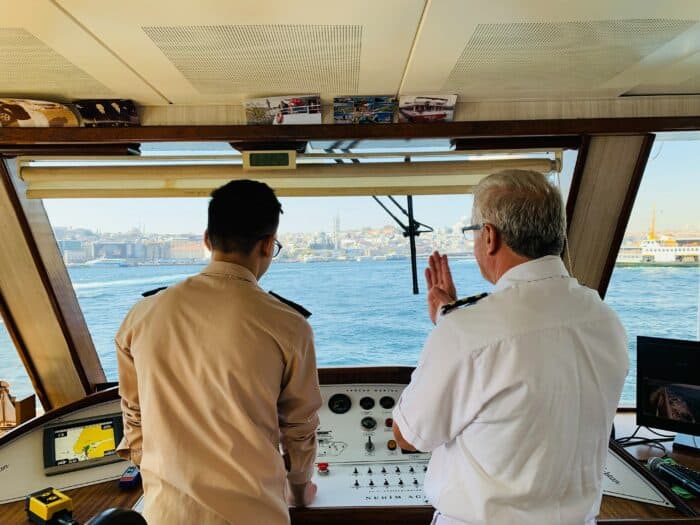
Most people feel a yacht has to be at least 60 or so feet in length before it’s considered a yacht. The longest yacht in the world is the Azzam which is just shy of 600 feet long. You can imagine that the captain of the Azzam has to deal with more than the captain of a 60 foot yacht. As such, the Azzam’s captain is probably making more money.
Size of the vessel is arguably the biggest factor in what a yacht captain gets paid. You can divide yacht sizes up into three categories as it relates to yacht captains to get a better idea of the pay involved.
I’ve included some survey data here taken from Dockwalk and this was gleaned from information provided by 476 different yacht captains to give you a pretty good idea of how much a captain makes at every single yacht size.
Junior Captain
A Junior Captain would be captain of the smaller yachts that rank in around 60 feet up to 100 feet. Many yachts of this size may only have one or two crew members on board to help operate them. The captain of a smaller yacht like this could expect to make perhaps $45,000 to $98,000 per year or more. Obviously this can change on a case by case basis depending on the specific duties expected of the given captain.
These smaller yachts have less involved operations and are, in general, easier to run which is why the captain of a yacht of this size would likely get paid less.
Survey data from 2021 shows that most captains working on yachts in this size range average just over $8,000 per month. On the low end of that scale were yacht captains pulling in about $3,100 a month while the highest paid make around $20,000 per month. Yacht captains can also pull in gratuities as part of the crew and that averages out to around another $1,300 per month.

In the middle is a Captain of vessels that range from 100 feet all the way to 170 feet which is superyacht territory. These vessels can include a crew of several different members and will require more organization and skill to maintain and run smoothly. At this size a Captain can expect to be making anywhere from about $80,000 per year up to $180,000.
Survey data from 2021 shows that, up to 140 feet, a superyacht captain can average about $10,100 per month. The lowest paid were making about $1,175 per month while the highest were again making around $20,000. You also pull in gratuities at this level that average just under $1,400 per month.
Yacht captains working vessels between 140 feet and about 190 feet were averaging $14,100 per month. At the low end of that scale you’re looking at $5,750 and it can go all the way up to $34,500 per month, so this is some serious money. If it’s a charter yacht, tips can reach nearly $3,000 a month as well.
Senior Master
A Senior Master is the captain of any yacht over 170 feet. This gets into megayacht territory at 200 feet and even gigayachts at 400+ feet. These captains have to be highly skill and managed not only massive crews that can include dozens of people, but a lot of more complex technology than the smaller vessels may be making use of.
Because of the demands of this job, it’s clear that pay grades increase substantially as well which is why captains at this level can make between $140,000 and $300,000 every year.
Survey data shows that between 180 feet and 240 feet, yacht captains had an average salary of just over $16,100 per month in 2021. That means a starting, low end salary of $9,200 per month which went all the way up to $23,250 per month. Tips closed in at just under $3,700 per month as well.
From 240 to 280 feet a yacht captain averaged just under $15,500 in 2021 which you’ll notice is oddly under the average for the next size down. The low end of the scale here paid just under $7,500 per month which is a good deal lower than the low end for slightly smaller vessels. On the high end captains were making $20,125. For whatever reason, yachts in this range just don’t pay as well as those in the 180 range, on average.
When you head to 280+ feet, the largest that the survey data was able to account for, yacht captains average about $20,500 per month. Remarkably, the low end here was $9,200 which is the same as vessels a full 100 feet shorter. However, on the high end some of these captains are making $32,000 per month. Factor in gratuities and that’s another $5,600 on average.
How Yacht Captains are Paid
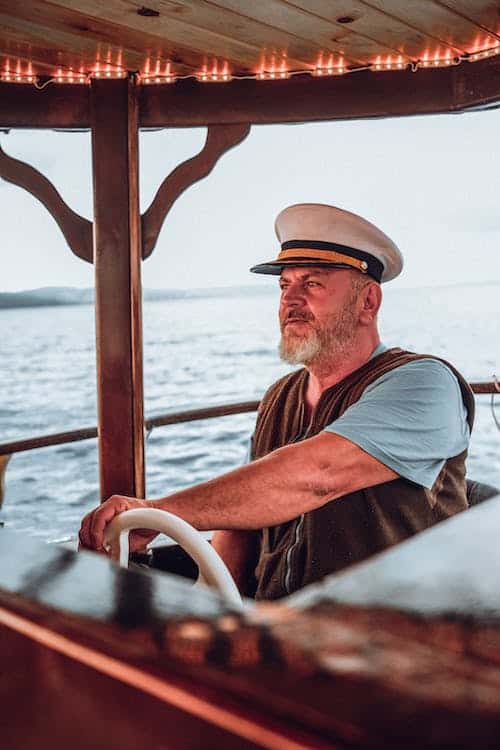
Most yacht captains get paid on a monthly basis. There are freelance captains who may also work under different payment terms. One such captain who responded to the survey charged $38 per hour as a flat rate. If they were chartered for a week, that would work out to $6,384 per week assuming you expect your captain to be ready for duty 24/7 on the water.
What do the Yacht Crew Members Make?
Like the captain, crew members can make more money on larger vessels and their experience in the business and time at sea can also factor in. But in general, here are some average numbers for crew salaries to put things in perspective.
First Officer
On a smaller yacht under 100 feet a first officer may earn up to about $65,000 per year. On a much larger yacht over 200 feet they could expect $100,000+
Second Mate
The bosun mate on a smaller yacht can start earning around $45,000+ per year. On a larger yacht over 200 feet this can be bumped up to well over $65,000 per year.
At the low end of the scale, on a smaller yacht a deckhand may make around $40,000 per year. However, on a much larger yacht they could potentially earn up to $65,000 per year.
Chief Engineer
A chief engineer on a small yacht may earn as much as $80,000 per year or more. On larger yachts that top 200 feet this can get closer to $150,000 per year thanks to the much more complicated machinery they need to deal with. They may also need to repair things like jet skis.
Assistant Engineer
The assistant engineer is obviously not earning what the chief does but they can still start at $45,000 per year or so. On large yachts this can reach over $85,000.
Chief Steward
The purser on a smaller yacht can make between $54,000 and $60,000. On the larger vessels this salary can increase to over $80,000.
A steward may make as much as $42,000 on some smaller yachts while that could increase to as much as $65,000 or more on larger vessels.
A trained chef can expect $60,000 on a small yacht and that can reach well over $105,000 on larger yachts. Many larger luxury yachts also bring in Michelin starred restaurant chefs to work for limited times and these chefs can earn quite a bit more.
On yachts up to 100 feet, a cook can look forward to making perhaps $54,000 to $60,000 per year. On the high end of the scale, a cook on a large yacht over 200 feet might make over $84,000 per year.
Motor Yacht Captains vs Sailing Yacht Captains
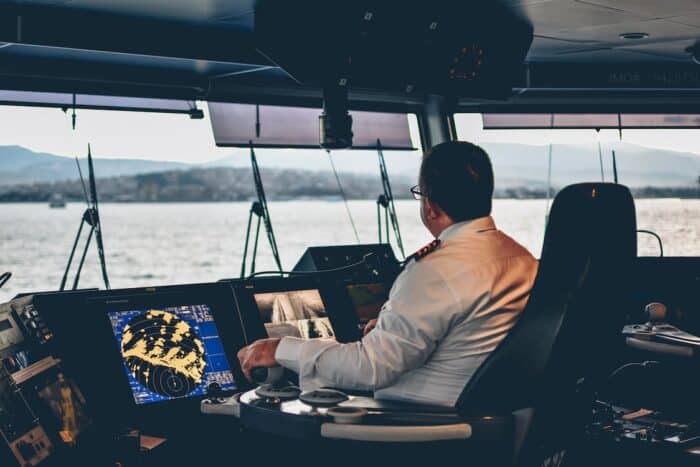
On smaller yachts, the salary difference between sailing yachts and motor yachts captains is often negligible or non-existent. As vessel size increases, the salary of a sailing yacht captain will tend to outpace that of a motor yacht captain, sometimes by a lot. Larger sailing yachts are often harder to come by and require more specialized knowledge so a captain able to handle a 200 foot sailing yacht is rather rare.
Jeff Bezos currently has the largest sailing yacht in the world at 416 feet while, as we said, the largest motor yacht is the Azzam at almost 600 feet. Though Bezos’ yacht has yet to hit the sea officially, we can assume her captain will be well compensated.
The Bottom Line
Because yacht captains may perform a wide range of duties for their clients, their pay range can vary widely as well. The yachting industry is nothing if not malleable about things like duties, yacht operations and salary ranges. As long as a captain is skilled and experienced they can expect to make a decent salary regardless of the size of the vessel, but it will definitely increase considerably as the yacht size increases. As such, yacht captain salaries can range anywhere from $3,100 per month to $32,000 per month.
My grandfather first took me fishing when I was too young to actually hold up a rod on my own. As an avid camper, hiker, and nature enthusiast I'm always looking for a new adventure.
Categories : Yachts
Leave a Reply Cancel reply
Your email address will not be published. Required fields are marked *
Save my name, email, and website in this browser for the next time I comment.
More in Yachts
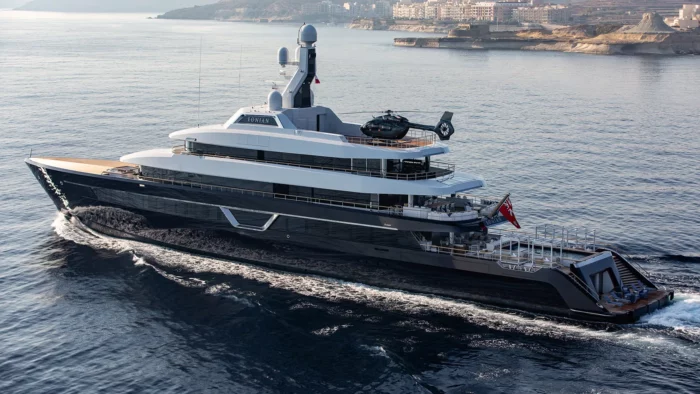
Lonian Yacht: An Insider's Guide
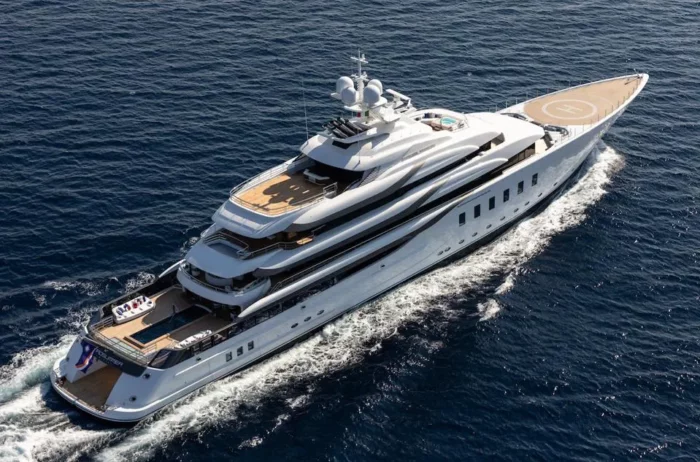
A Closer Look at the Madsummer Yacht
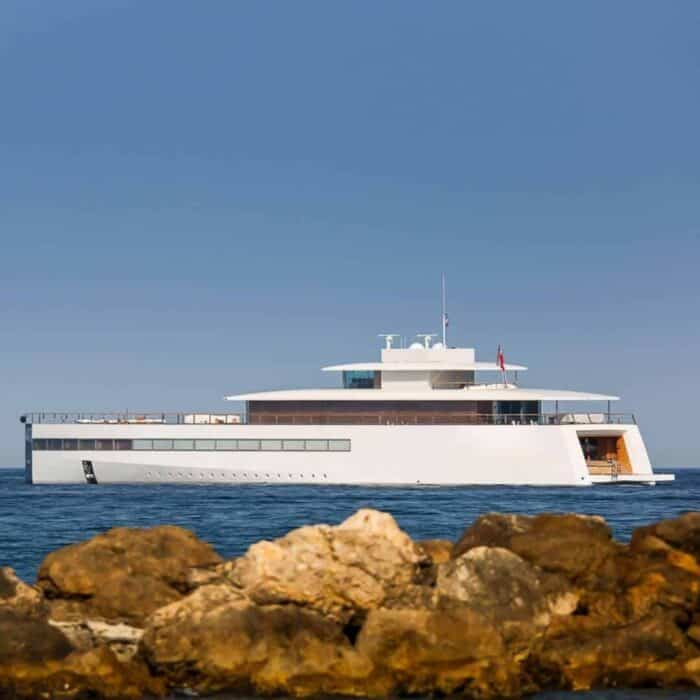
Your Insider’s Look at Steve Jobs’ Yacht Venus
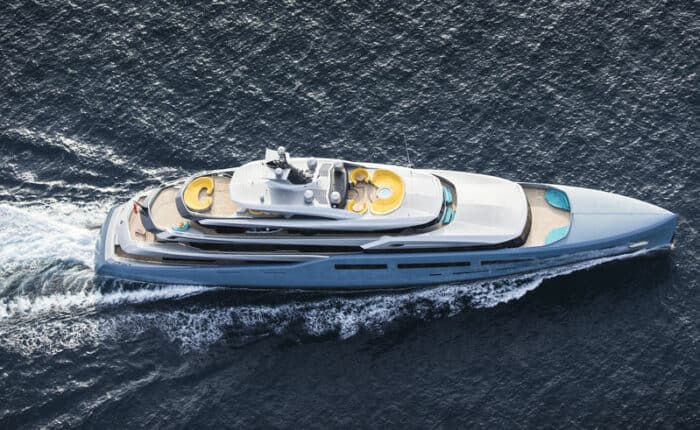
Your Insider’s Guide to the Aviva Yacht

The People’s Poncho Review and Ratings

Oru Lake Kayak Review

What Is A Gunwale?

131 of the Best Hawaiian Boat Names
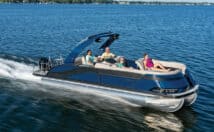
167 Patriotic Boat Names
About boatsafe.
Established in 1998, BoatSafe is your independent guide into the world of boating, fishing, and watersports. We provide expert insights and detailed guides to help you find products tailored to your needs and budget.
Contact Boatsafe
- Address: 4021 West Walnut Street. Rogers, AR 72756
- Phone: (479)339-4795
- Email: [email protected]
Site Navigation
- How We Test
- Corrections Policy
- Privacy Policy
- Terms & Conditions
- Editorial Policy
- Affiliate Disclosure
Our Reviews
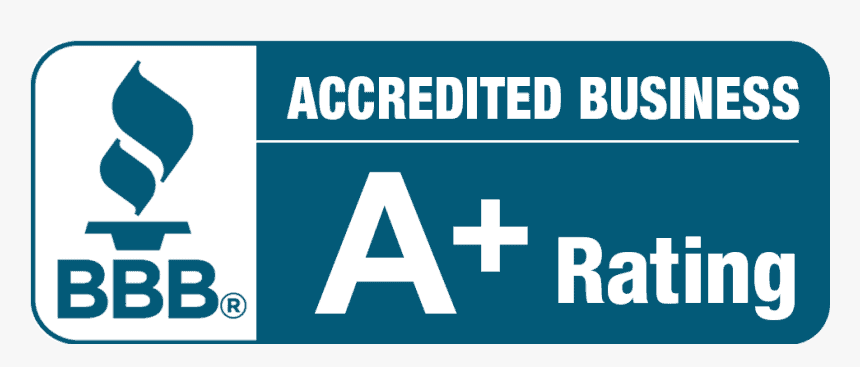
All content is © Copyright 2024. All rights reserved.
$150 OFF Captain's License Courses! Use code: CAP150
- Get Started
- OUPV/Six-Pack Captain’s License
- 25/50 or 100-Ton Master Captain’s License
- License Endorsements
- All USCG Captain's License Courses
- FCC MROP – Marine Radio Operator Permit
- FCC Exam Package Deals
- FCC Individual Exams
- FCC Practice Test Books
- Captain's License Guides
- FCC License Guides
- Why Our Students Succeed
- MLS Learning Tools
- Online Testing
- American Hero Fund (ID.me)
- Licensing Guides
- How To Videos
- Help Center
- 24/7 Live Technical Support
- Mariners Life
- Mariners Gear
Add description, images, menus and links to your mega menu
A column with no settings can be used as a spacer
Link to your collections, sales and even external links
Add up to five columns

Captain's Licensing
Professional USCG & FCC Licensing
Charter Boat Captain
Licenses for Part-Time & Weekend Warriors
Licensing for Safety
Enhanced Skills and Knowledge
Professional Boat Operations
Commercially Required Licenses
Popular Courses
Not sure where to start.
Rely on our decades of expertise to guide your adventure!

Why Mariners?
Academic excellence, flexible learning, pass guarantee, veteran owned, it all started with a catamaran.
We are Mariners Learning System, an online education provider who meets the United States Coast Guard written requirement for obtaining a Captain’s License. It all began with a 2.5 year sailing trip around the world, after which founder Robert Figular sought to create a different kind of educational program than what is typically offered— one that would effectively equip and prepare future captains while providing superior service at a reasonable price.
Why Trust Our Courses?
Whether you’re looking to learn new boating skills, improve safety, or become a member of a boating crew, earning your USCG Captain’s License from our expert curriculum will provide you with the knowledge, confidence, and certification you need to pursue many new opportunities.
Are you pursuing a career, juggling a family, or simply too busy boating? We know life can get hectic. Completing our courses can be done at your own pace and in your own time. Our online system saves your progress so you can pick it back up anytime and on any device.
Our highly trained team of boating experts are ready to guide your adventure every step of the way. We wrote, optimized, and tested the courses, so you can rest assured you're receiving the best education possible. Our Customer and Technical Support teams are ready to respond to your questions 24/7!
After decades of writing and building curriculum and helping over 200,000+ boaters complete a course and pass their test, we know what works. Our course materials are cutting edge, dynamic, engaging, and where applicable, US Coast Guard Approved.
200,000+ Students Can’t Be Wrong!
Over the last two decades, our courses continue to evolve and improve. Along with our expert, 24/7 technical support team and a 98.7% pass rate, we guarantee you’ll be happy with your Mariners experience.
"I tested tonight and had great success. Thank you all for your guidance through this experience. The staff at Mariners couldn't be more professional, patient, and prompt. I'm looking forward to applying what I've learned on the water. Thank you, Mariners Learning System."
Captain's Licenses
Earn your US Coast Guard-Approved Captain’s License at home or on the go! Mariners provides flexible and convenient boat captain course training so you can learn on your schedule, not ours. Take your final licensing exam online and on-demand. Start with our OUPV/Six-Pack License for up to 6 passengers, or if captaining a large vessel, check out our 25/50 or 100-Ton Masters.
FCC Commercial Radio Operator Licenses
Obtaining an FCC radio operator license is essential to operate, repair, and maintain ship and aircraft radio communication stations effectively. As an approved COLEM, Mariners Learning System provides online element exam testing and support, guiding individuals through the commercial radio system licensing process with expertise and efficiency. Our package deals streamline the process by offering online exams, allowing you to conveniently obtain the correct license needed for your role.
Want to Test Us Out?
Sign up for a free trial of one of our USCG Captain's License courses.
Live the Mariners Life
Become a master.
Looking to conquer expert level? Get your 25/50 or 100-Ton Master Captain’s License, now.
Sign up for our definitive free guide to becoming a Licensed Captain. Or take the quiz to find the right course for you.
Ready to Get Started?
Shop Current Boating Education Courses or Talk to a Licensing Specialist

- Search Used Yachts For Sale
- Search Boats By Brand
- Search Boats By Type
- Search By Location
- Search By Price
- What's My Boat Worth?
- Search Boats Just Listed
- Small Yachts
- Custom Sport Fishing Boats
- Finance A Boat
- Amer Yachts
- Aquitalia Yachts
- Cabo Yachts
- Century Boats
- French Yachts
- Gulfstream Yachts
- Hatteras Yachts
- Shelter Island Yachts
- Solaris Yachts
- Sunpower Yachts
- Sunreef Yachts
- Vela Boatworks
- Virtus Yachts
- Why List With United?
- Why Own A Boat Or Yacht?
- Custom Website For Your Yacht
- United Sold Boats
- Buy A Yacht With Crypto
- Find a Yacht Broker Near Me
- Search For Broker By Name
- Meet The United Support Team
- Our History
- Fort Lauderdale Boat Show
- Stuart Boat Show
- Miami Boat Show
- Palm Beach Boat Show
- Other Boat Shows
- Yachting News
- Yacht Closing Services
- River Forest Yachting Centers

Search All Yachts
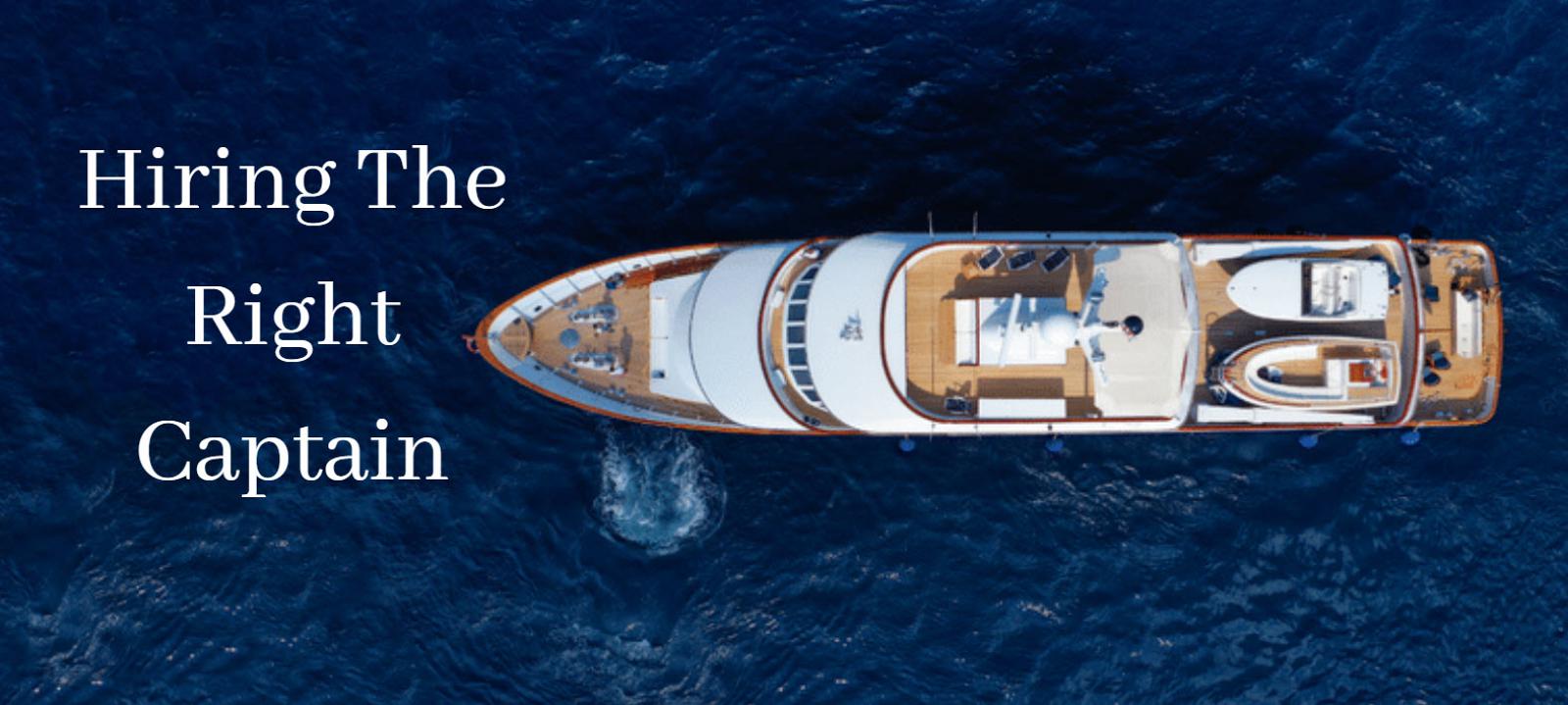
How To Hire The Right Yacht Captain
By Rob Bowman | Posted On Feb 25, 2021 Updated On Apr 16, 2024
"Hiring the right captain and crew for your yacht is the single most important thing you can do when it comes to enjoying your time on board," said Captain Jeff Palmer, longtime motor yacht captain turned professional yacht broker. "Especially for first time yacht buyers, the captain can really make or break the experience."
The reason people purchase a motor yacht is to enjoy their free time, relax in a stress-free environment, and to share this moment with their loved ones. When everything from the perfect weather, to the right destination, and the synergy among your guests is all aligned, the feeling is indescribable. It doesn't take but one mistake from the captain or a difficult crew member to put a damper on your plans. In extreme cases, hiring the wrong captain could even result in damage to your yacht, whether aesthetic or mechanical.
So where does a new yacht owner turn when hiring a captain? United Yacht Sales spoke with 3 longtime motor yacht captains to get their advice on what new buyers should do, as well as longtime owners looking to make a change.
Captain Ken Gibson
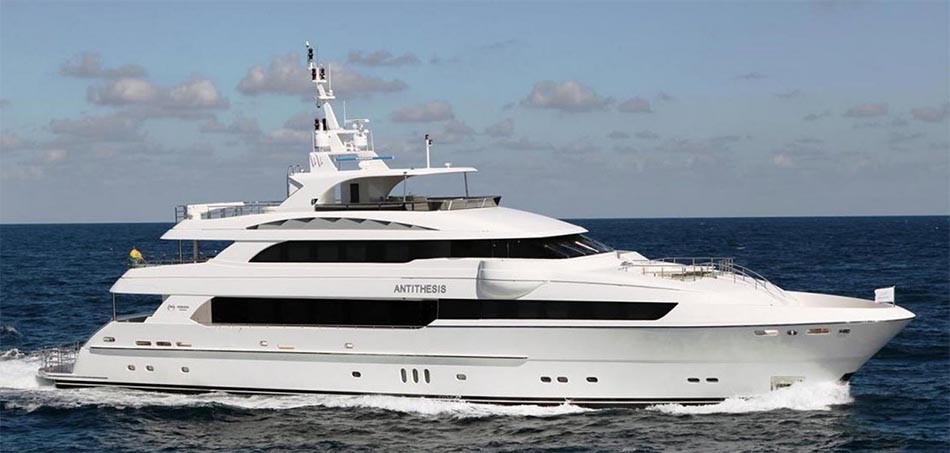
Captain Ken Gibson has seen it all. Since 1981 when he first got his captain's license, Ken has been both a captain for private owners setting out on month-long voyages to tropical destinations and for charter yachts earning income as a business. Ken has over 1 million miles on the water. He is currently in charge of a 136' Horizon Yacht that was sold in 2020 by United Yacht Sales broker Greg Graham . One advantage of working with a professional yacht broker is the referral of a reputable captain that broker knows and trusts.
Known for being very thorough and detail-oriented, Captain Ken spent 24 years in the Coast Guard and retired as a Commanding Officer based at the station in Fire Island, New York. His training has given him the skills needed to properly manage a crew and a yacht simultaneously. "I run the crew on board like a team," said Captain Ken. "Everyone on board has everyone's backs. Everything good and bad that happens on the boat comes through me and I am responsible for being the communication to the owner. A chain of command and a structure is very important when managing a large yacht. Good crew appreciate that structure as well"
He continued on the advantages of hiring the captain first and allowing that captain to hire the right crew members. "I don't take a job unless I am responsible for the hiring and management of the crew," says Ken. "I look for crew members that can do multiple jobs so our team is cross-trained and can be efficient."
So what did Captain Ken have to say about finding the right yacht captain? He says to look for these things:
- When you're reviewing resumes, look for the captain's experience in terms of longevity. How long have they been on their boat? Have they moved around a lot? Longevity is a sign of stability and maybe a glimpse into the owner's overall happiness with the job they're doing.
- Does the captain have leadership and management experience outside of yachting? Being able to motivate and get along with the crew is essential. I would advise new owners to look for some kind of overall management training or experience.
- Good captains are going to work 7 days a week for you and be on call 24 hours a day during the time they manage a yacht.
- Does the captain already have crew that want to work for him? This is an important sign as good captains generally have several crew members they have worked with for years and could be recommended.
Another question that often comes up is, "How much does a yacht captain earn?". Captain Ken says there is an often-repeated misconception that $1,000 per foot is the going rate for a yacht captain, which may have been true 25-30 years ago. "The best advice I can give is to find the right captain for you first and then discuss the compensation. The salary is dependent on a lot of details with that specific job. Especially if the captain will be working 7 days a week, they're essentially giving up months of their life at a time."
Finally, Captain Ken encouraged yacht owners to seek out the Private Facebook Group called (COC) Captains On Call . This is a private group you have to request to join. Only yacht owners and captains are allowed to be members. If you want to know more, Captain Ken can be reached at [email protected] .
Captain Ben Pollon
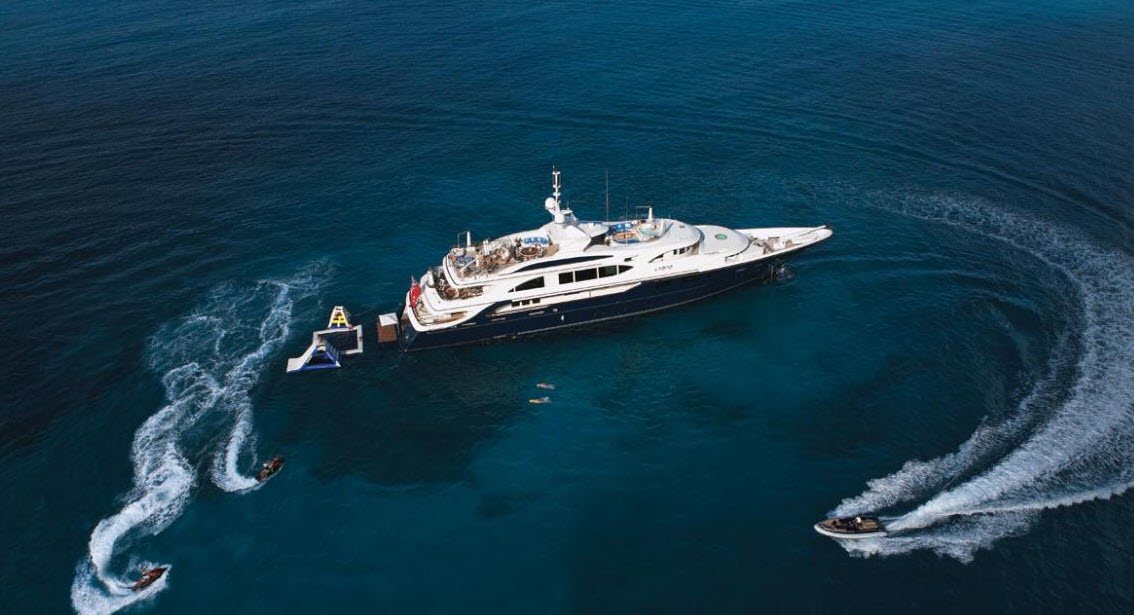
Captain Ben Pollon grew up in the Turks and Caicos Islands in a family of sailors who instilled in him a strong passion for the water. After owning a marine repair business in Fort Lauderdale, Ben became a full time captain, "Mainly on 50 to 60 meter yachts." he says. Ben went on to earn his 3000GT Masters License and spent over 15 years managing multiple high-profile charter yachts. "Some boats had 15-plus crew on board," Ben continued.
Ben knows what it takes to successfully manage a crewed yacht placed into a charter program and the demands it requires. “If you’re a new yacht owner, the best thing you can do is choose a Captain and thoroughly explain your needs and expectations,” Ben elaborated that running a large modern yacht is akin to running a small business with the Captain at the head of it "Giving a captain the tools he needs to run the boat effectively will ultimately result in a better experience for the owner when they step on board."
Captain Ben gave some additional pointers on where to find a captain and what to look for:
- Referrals can be great, but do your homework. If you interview a captain that was a referral from your yacht broker or a friend, make sure you ask to speak with past yacht owners they've worked for.
- Choosing a captain is size dependent. It's important that the captain's experience be relative to the size of the yacht you own.
- There's nothing wrong with going to a crew agency and letting them know you're looking for a captain. Getting the word out in the yachting community is important to getting a good selection of resumes.
- Don't rush your interviews. Ask for a second interview as you narrow down your choices. It's important to find a captain that fits within your program, whatever that may be. Find the right fit!
Captain Ben also agreed that $1,000 per foot for a captain's salary was dated. "Be open minded about the salary you're going to pay your captain," said Ben. "The pay is definitely commensurate on experience and I recommend working on finding the right fit, before discussions on salary even begin."
Captain Jeff Palmer
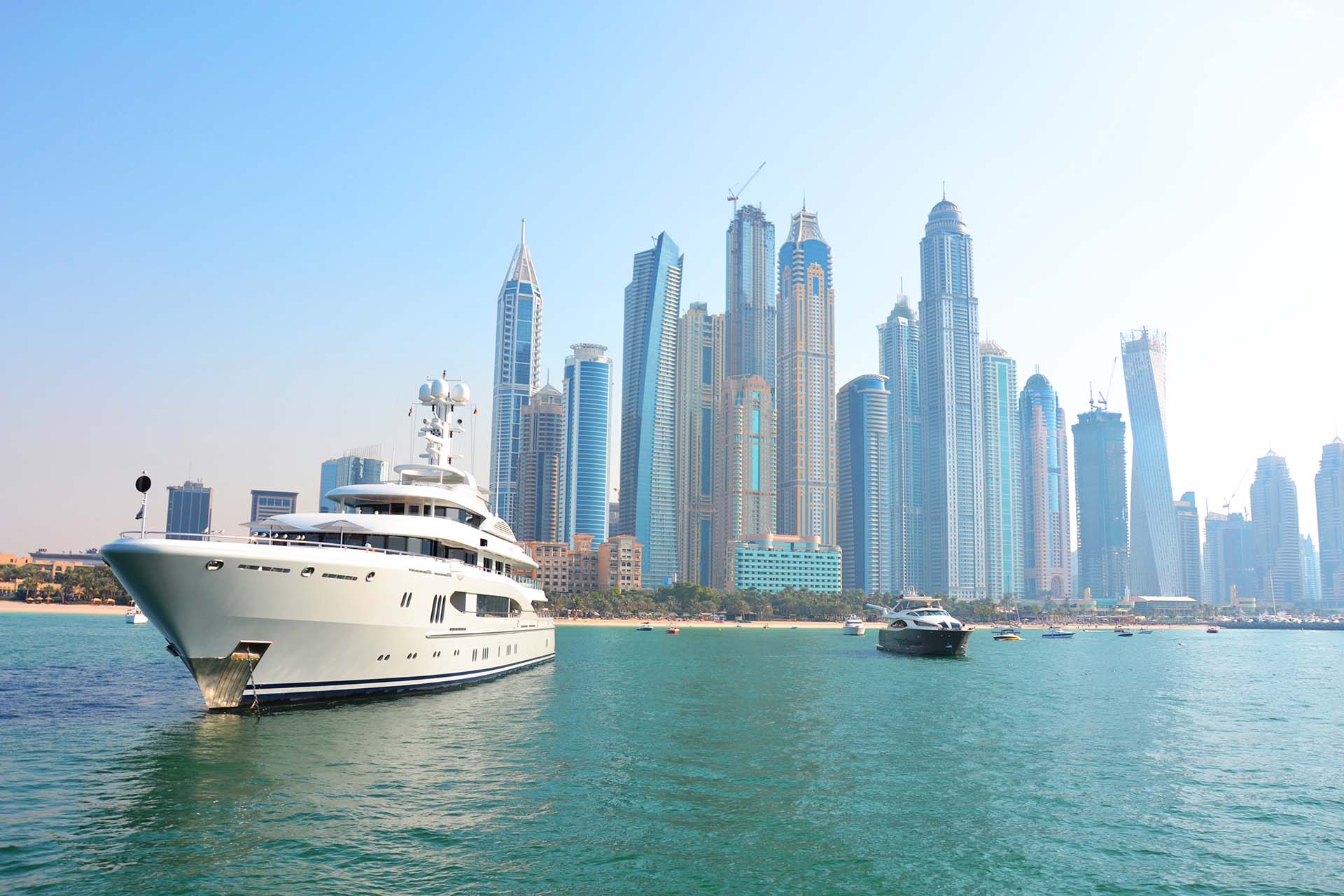
Captain Jeff Palmer has done everything there is to do in the realm of boating. He started as a welder and search rescue team member on the USS Dahlgren in the U.S. Navy, later becoming a deckhand on several yachts throughout the Caribbean. Jeff moved on to becoming a captain in 1992 and has managed everything from sailboats , to Hatteras Yachts , to "GEORGIA", the world's largest sloop at 159'. Mostly Jeff captained 180-foot plus motor yachts. Today, he's not only a professional yacht broker, but he's also part owner of United Yacht Sales.
Jeff has engrained himself in South Florida as the head recruiter for UYS and often speaks with brokers, captains, crew, and owners. "It used to be that boats over 60 feet had a captain and a crew member," said Jeff. "Now with the advancements in technology, that size has grown to over 75-feet on average. People want their privacy."
Still, Jeff is adamant with yacht owners about hiring a captain, "Seriously consider hiring a captain to eliminate the work and worry, while also getting to know your boat," he says. Jeff's top takeaways when it comes to hiring a captain include:
- Word of mouth is a big thing with finding a captain. Your yacht broker should definitely be able to introduce you to a captain or at least put the word of mouth out there. United Yacht Sales has a broker forum where all 200+ of our yacht brokers communicate with each other.
- Good captains don't have a lot of turn over. When you're conducting your interview, look for longevity in both the captain's employment, as well as how often crew changes positions.
- It's a huge benefit if the captain also has a mechanical background. A good captain will be able to guide you with servicing your yacht and be able to negotiate fair prices for repairs.
- References are great from past owners, but also ask for references from past crew as well.
Jeff confirmed what both Captain Ben Pollon and Captain Ken Gibson said about what salary to pay a yacht captain. "1,000 a foot has been around forever and it's archaic," he said. "A lot of what you're going to pay a captain depends on the program. Is it seasonal? Full time? What size boat and how many days on board? Will the captain get charter tips? There are a lot of variables to the discussion."
As a professional yacht brokerage firm in the industry since 2002 and with over 250 yacht brokers on our team, United Yacht Sales has the network of buyers, sellers, and captains to assist you in your yachting plans. Contact us today at 1-772-463-3131 whether you are looking to buy a yacht, sell your existing boat, or just want advice on finding a captain.
Related Articles You Might Also Be Intersted In :
- What Is The Best Time Of Year To Sell A Boat?
- Are Yachts Worth Buying?
- How Much Should I Pay For A Yacht?
- How Much Should You Spend On A Yacht?
- What Does A Yacht Broker Do?
- Why Are Boats So Expensive?
- How Much Does It Cost To Buy A Yacht?
- Can I Sell My Yacht Without A Broker?
- How To Choose The Right Yacht Broker
- What Is The Best Sportfish?
- How Much Is A Sportfishing Yacht?
- How Much Does A Fishing Yacht Cost?
- How Fast Do Sportfishing Yachts Go?
- What To Do To Help Sell Your Boat Faster
- What Are The Most Popular Yacht Brands?
- Key Advice For Buying A Yacht
- How Much Does It Cost To Own A Yacht?
Interesting Boating Links
Worldwide yacht sales.
- Boat Sales Charleston SC
- Yacht Search By Location
- Cape Cod Boat Sales
- Sunreef 60 Electric Hybrid Catamaran Price
- Yachts in Jacksonville Florida
- Used Boats For Sale in Alabama
- Yachts For Sale in Georgia
- 15M Boat For Sale
Luxury Boats & Yachts
- Sailboats For Sale Texas
- Yacht Dealer
- Yachts For Sale by Price
- Used Center Console Boats For Sale
- Used Boats Near Me
- Hinckley Yachts For Sale
- 40 Foot Boat
- Bertram Yachts
- Azimut Yachts Price
- 60 Ft Yacht For Sale
- Prestige Yachts
- Yachts For Sale Near Me
Popular Builders & Models
- 50 Foot Viking Sportfish
- Cabin Boats For Sale Near Me
- 40 Sea Ray Sundancer
- 45 Ft Sea Ray Sundancer For Sale
- Used Contender Boats For Sale in Louisiana
- 36 Albemarle For Sale
- Motor Yachts For Sale
- Used Race Boats For Sale
- Express Cruiser Yachts For Sale
- Used Small Sailboats For Sale
- Back Cove 390
- Grand Banks Yachts For Sale
Trending Brands & Types
- New Yachts For Sale
- Jim Smith Yachts
- Used Ranger Tugs For Sale
- Used Grady White Boats For Sale
- Krogen Yachts
- Selene Trawlers For Sale
- Pershing Boats For Sale
- Beneteau Boats For Sale
- Riviera Boats For Sale in USA
- 32 Yellowfin For Sale
- Egg Harbor For Sale
- Used Hatteras Boats For Sale
- Palm Beach Motor Yachts
- Tartan Sailboats For Sale
SEND UYS A MESSAGE
Recent posts.

Jul 15, 2024
Luxury Yachts For Luxury Buyers

Jul 11, 2024
2nd Quarter Report: Yacht Sales Grow 22 Percent

Jul 01, 2024
The Hot List - July 2024

Jun 28, 2024
10 Fun Flybridge Yachts You Can't Miss

A day in the life of a superyacht captain
It’s easy to think that a captain’s job is to drive a superyacht to glamorous locations and drop the anchor in idyllic anchorages, but as Kelly Gordon and other captains will tell you, that’s only a tiny part of the role.
For Kelly Gordon, captaining a superyacht was something she never imagined until she had already started a career as a chemistry professor when a chance encounter at a party on a large motor yacht changed everything. Now, having uncovered her passion for the sea and having achieved the ultimate position as a superyacht captain, Gordon is not only a role model for female crew who want to pursue a career on the deck and engineering side of superyachts, but is also an active advocate of crew mental health. But what exactly does a superyacht captain do, and is it just about driving the yacht from A to B and making sure the crew keep it in top condition?
The simple answer, says Gordon, is no – and in fact the role of a modern yacht captain is highly complex and multifaceted. Take Gordon’s current command, for example – a 33-metre private yacht that cruises extensively with the owning family on board. “My responsibilities of course encompass safely operating and navigating the boat – that’s the technical side of it,” Gordon begins. “But actually the smallest element is navigation and operation, and the far bigger side is crew management. I spend a tremendous amount of time with the crew, making sure everyone’s got what they need.
“Along with that too,” she continues, “is making sure that the owners and their family have what they need, and understanding what their plans are. Where do they want to go? What are they wanting to do? It’s about making sure they are always well cared for.”
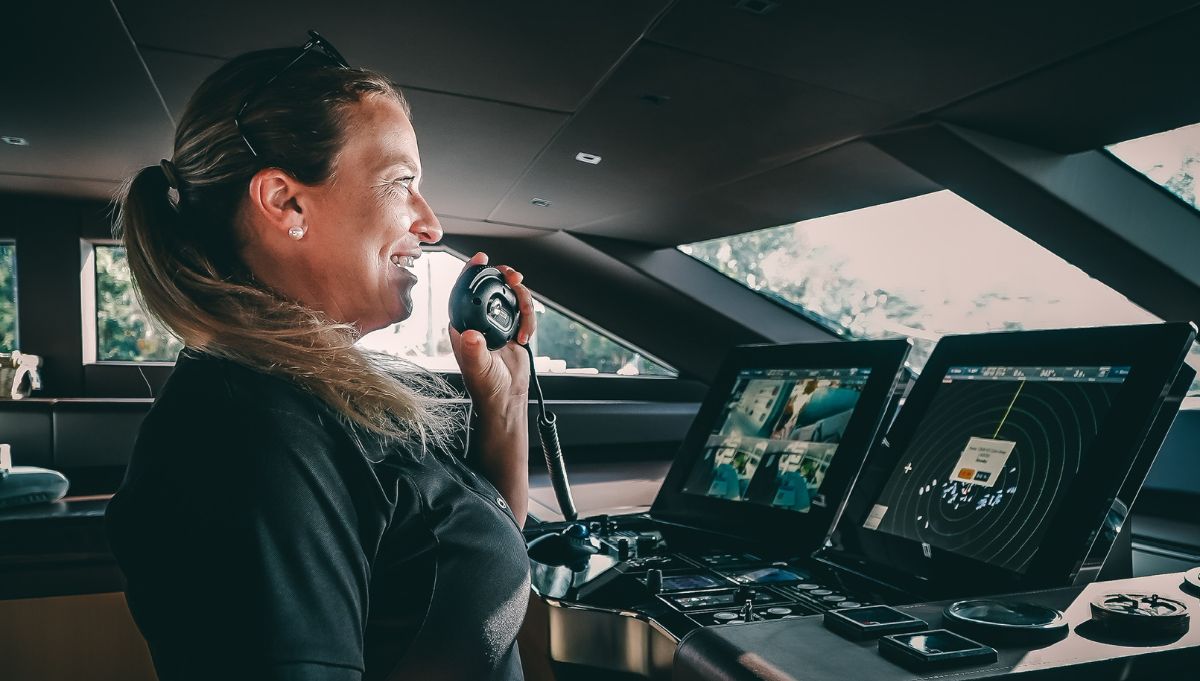
Changing landscapes
The early days of yachting were, in some ways, a much simpler time. Yachts on average were smaller, and captains and crews often came from a sailing or boating background. There were elements that a captain had to understand and undertake, such as holding a recognised commercial skipper’s ticket, keeping logs, managing the yacht’s accounts and so on. But as the fleet has grown and as yachts have grown, so too have the duties expected of captains.
“As a captain, especially the larger and larger you go in terms of yacht, you become the CEO of a company in a way,” Gordon offers. “But you’re doing what you’re trained to do. To operate and navigate the yacht actually ends up being the smaller percentage of what you do, and the day-to-day is emails, paperwork, schedules, plans, maintenance if you’re in the shipyard, and whether you charter or are private you still need to know where the boss or potential guest wants to go, and show them a good time.”
Paper tigers
One thing that has definitely changed over time is the increasing burden of paperwork related to regulatory elements such as the International Safety Management code (ISM) and in some cases the International Ship and Port Facility Security Code (ISPS). “The biggest change I’ve seen since I started is a regulatory change,” offers Captain Steve Osborne . “I find myself spending more and more time on more and more paperwork. There’s a lot of delegation you can do, but you have to really start to understand a lot of the legal frameworks of where you’re going [with the yacht] and be a bit more cautious and pay a bit more attention, because rules have changed over time and are a bit more stringent now.”
Gordon agrees that the burdens have increased, but also argues that there are benefits. “The paperwork has grown, but I think it’s a good thing,” she asserts. “I actually think there probably can stand to be a little more regulation in the industry. When I talk to my buddies who are working on commercial vessels and I see how things are done – granted, they have their own sets of issues as well – I think it’s good that we take a page or two out of their book.”
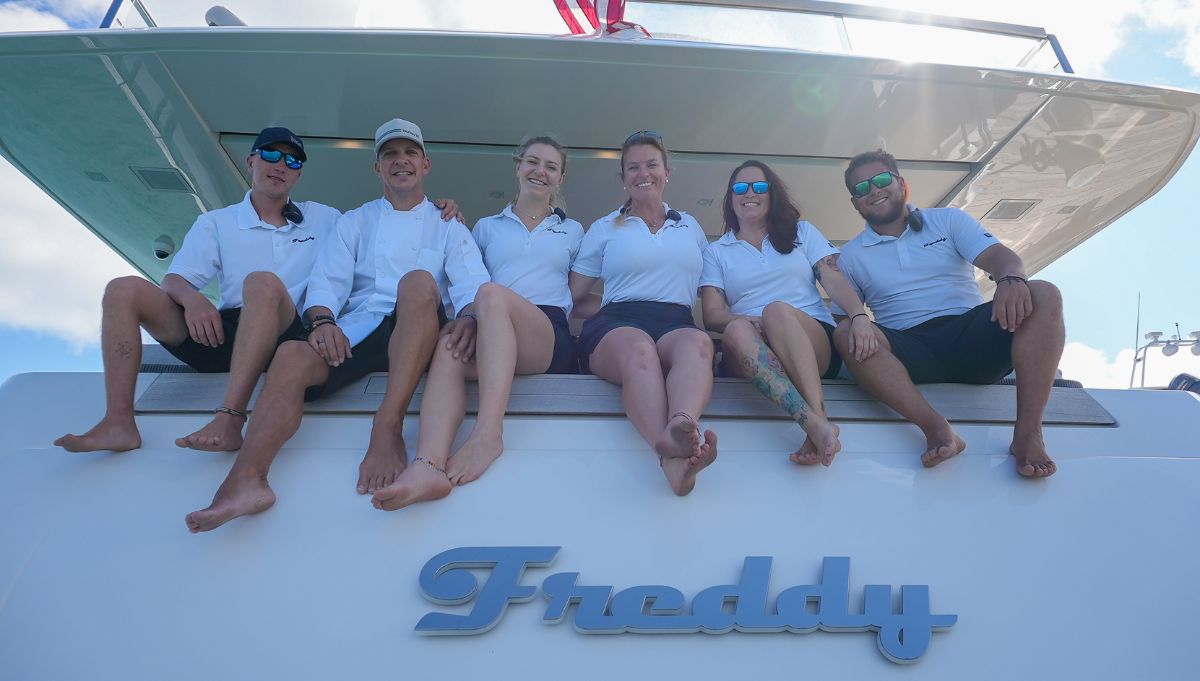
Mind over matter
One of the biggest elements of being a superyacht captain is being able to look after a superyacht crew, and that means not only nurturing and mentoring crew members but also, increasingly, being aware of other issues that can arise – particularly when crews are living in close quarters and working long hours.
“The driving-the-boat bit is easy, that’s our bread and butter,” says Captain Matthew Pownell-Jones. “It’s the other stuff that no one actually teaches you – how to care about the crew, how to listen to someone who has maybe just joined the crew and has a problem that no one knows about. The crew is a floating family, and if that’s the way you think of it then that’s how I feel a team works well.”
It’s something that Gordon has put front and centre not only of how she runs her own yacht and crew, but also of raising awareness in the industry of the importance of mental health considerations. “I’m pretty hard-charging in the mental health space for crew and the yachting industry,” she says. “I’m determined that we will see change, and will see a better and safer workplace for crew, both in terms of general safety on board and also in terms of mental safety.
“I’m not that old – I am only 42 – and just over the course of my life and in my 15 years in this industry I’ve seen it change in terms of being able to talk about it, and it being accepted as a conversation and as part of our overall health. It’s so important because on board we don’t work a nine-to-five then clock out and get to go home to our safe space.”
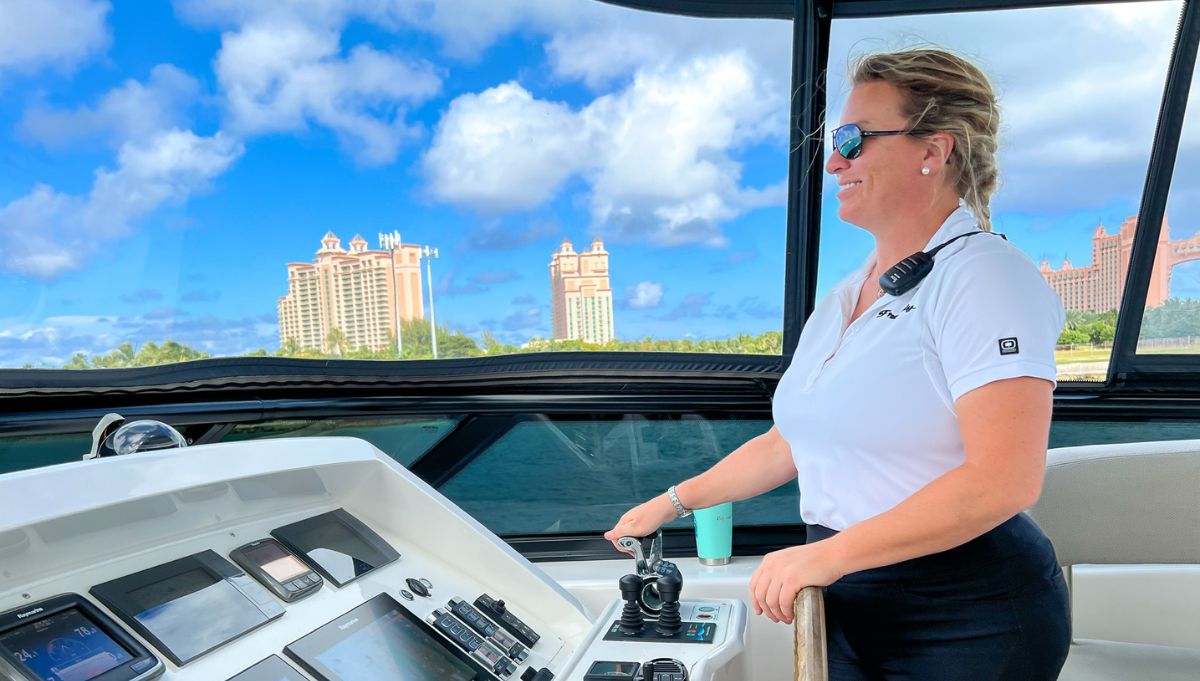
Guest appearance
For all the paperwork, planning and crew management, there is of course the part that makes superyachting what it is – yacht owners and yacht charterers enjoying what a superyacht offers and the places it can take them. It’s perhaps the final piece of the puzzle for an experienced superyacht captain.
“For private cruising or for yacht charter alike, first of all, you want to make sure the yacht is clean and ready to present to the boss or the guests and that each crew member knows who’s doing what,” Gordon enthuses. “If it’s a little booze cruise, the stews need make sure all the drinks are on board and that the yacht interior looks pretty nice and warm and fuzzy. My engineer has to make sure everything’s operating and working, and then the guys on deck make sure that everything’s taken care of on the exterior.
“Then with me, it’s communicating back and forth with the family or the charter guests as to where they want to go or what they want to do, and then communicating that to my crew. And when it gets busy and the days get long, with the crew potentially on call, I try to balance everything by making sure everyone is getting breaks, and offsetting the crews’ functions so that there’s always someone up with the guests and always someone getting some rest to be able to relieve whoever’s on duty.
“People ask me that the best part of my job as captain is outside being able to utilise my skill of navigation and operation of the yacht,” she concludes, “and my favourite part of the job is also the most difficult part – and that’s the crew. I love them to death. My current boat is a happy, fun, loving, playful, hard-working professional boat, but it’s taken a long time to put that together. If you work at it as a captain and you put the time in and invest in finding and mentoring, you can create that.”
Do you work in the superyacht industry? Yes No I would like to receive updates from Superyacht Life
Don’t miss out
Sign up to our newsletter and get our latest stories delivered monthly to your inbox.
Back to Blog
Captains Clients Superyacht Industry Insights
Superyacht Captain salary survey 2023 18 December 2023
captain salary survey crew salary survey superyacht captain superyacht salaries yacht captain
In our biggest salary survey yet, we have uncovered detailed insights into Superyacht Captain salary and leave packages.
Almost 300 Captains responded across a range of yacht sizes from sub-30m to 100m+. In addition to average pay and leave, pay rise and bonus activity, the 20+ page report also compares Captain and Chief Officer experience, ticket level, longevity onboard and comparisons to our 2020 and 2022 survey findings.
Some top-level statistics are:
- Every yacht bracket has seen a salary rise since 2020 and 2022.
- Full rotation is also increasing and becoming more prevalent on sub-50m yachts, with an 11% decline overall in Captains with less than 59 days leave.
- Two-fifths of Captains receive an annual pay rise, although this is not part of their contract.
- 38% receive a 13th-month bonus, but random and unpredictable bonuses are more commonplace.
- 70% of Captains have Master 3000.
- Exactly half of the Captains who responded have more than 10 years’ experience in the role and 32% were Chief Officers for 3 to 5 years prior.
- A third have been Captains on their current yacht for more than 3 years.
- Flight allowance improves with yacht size, with 49% of Captains receiving Business Class flights as part of their package.
- The average age at which respondents first became Captain is 32.5 years old.
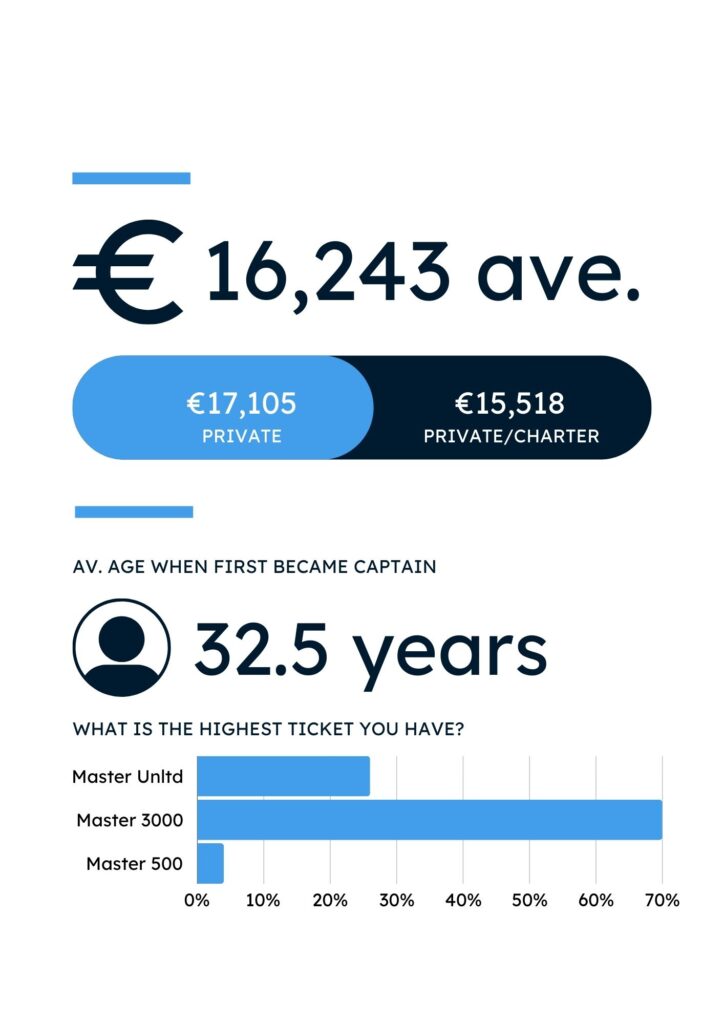
The full report contains a comprehensive analysis of salaries and leave in each yacht size bracket and also compares full time with rotational roles, as well as explores any correlation between experience and type of ticket.
Simon Ladbrooke, Captain Consultant at Quay Crew, commented:
“In our most detailed salary report to date, we have gained an insight into the real-time compensation Captains receive, broken down by yacht size and with several other comparables too.
“A key takeaway this year is that, despite a slight decline in salaries between 2020 and 2022, the average monthly pay is now higher across all size brackets, representing a median 6.75% increase.
“Time for time rotation has also grown in popularity on all sized yachts, with the exception of <39m yachts which are all full-time at the moment.
“By gathering Chief Officer experience as well as longevity on their current yacht, we can surmise that onboard promotion is on the rise. The average age that someone becomes Captain is now older and the number of years of experience as Chief Officer is higher, suggesting the transition is also taking longer.
“This is undoubtedly down to there being more competition amongst candidates and it being more difficult to make that initial step up.
“Yet, almost three-quarters say it took them less than 6 months to get their first Captain role. This could be, along with the extensive CO experience demonstrated in this survey, largely down to onboard promotion.
Having said that, we were very surprised at this statistic as it doesn’t match at all with our experience. Often, Chief Officers are looking for several years before they finally get their opportunity. It’s something we definitely want to explore further in another survey.”
All HOD salary surveys are available on our client portal, which you can request access to here.

About the author
Simon Ladbrooke
Compassion at christmas: the yachting edition, interview questions to ask as a captain candidate, keep up to date sign up to the quay crew newsletter.
I have read the Terms & Conditions and would like to be added to the mailing list
- Superyacht Recruitment Services
- Superyacht Captain Recruitment
- Partnerships
- Meet the Team
- Work for Us
- Current Vacancies
- Crew Resources
- Candidate Login
- Candidate Registration
- Client Login / Register
- Candidate Login / Register
- PRO Courses Guides New Tech Help Pro Expert Videos About wikiHow Pro Upgrade Sign In
- EDIT Edit this Article
- EXPLORE Tech Help Pro About Us Random Article Quizzes Request a New Article Community Dashboard This Or That Game Happiness Hub Popular Categories Arts and Entertainment Artwork Books Movies Computers and Electronics Computers Phone Skills Technology Hacks Health Men's Health Mental Health Women's Health Relationships Dating Love Relationship Issues Hobbies and Crafts Crafts Drawing Games Education & Communication Communication Skills Personal Development Studying Personal Care and Style Fashion Hair Care Personal Hygiene Youth Personal Care School Stuff Dating All Categories Arts and Entertainment Finance and Business Home and Garden Relationship Quizzes Cars & Other Vehicles Food and Entertaining Personal Care and Style Sports and Fitness Computers and Electronics Health Pets and Animals Travel Education & Communication Hobbies and Crafts Philosophy and Religion Work World Family Life Holidays and Traditions Relationships Youth
- Browse Articles
- Learn Something New
- Quizzes Hot
- Happiness Hub
- This Or That Game
- Train Your Brain
- Explore More
- Support wikiHow
- About wikiHow
- Log in / Sign up
- Occupations
- Transport Careers
How to Become a Boat Captain
Last Updated: April 29, 2024 References
Getting a Job
Expert q&a.
This article was co-authored by Nitzan Levy . Captain Nitzan Levy is a Sailor, Social Entrepreneur, and the Founder of Sailors NYC, a recreational sailors’ club based in Jersey City, New Jersey that specializes in cruising boats and a variety of community programs. Capt. Levy has over 20 years of sailing experience and has sailed in many places around the world including: the Atlantic Ocean, the Mediterranean Sea, The Caribbean, and the Indian Ocean. Capt. Levy is a U.S. Coast Guard Licensed Master of vessels up to 50 Tons with Auxiliary Sail and Assistance Towing Endorsements. Capt. Levy is also a NauticEd Level V Captain Rank Chief Instructor, an American National Standards Assessor, an SLC instructor, an ASA (American Sailing Association) Certified Instructor Bareboat Chartering, and an Israeli licensed skipper on Boats for International Voyages. There are 10 references cited in this article, which can be found at the bottom of the page. This article has been viewed 133,133 times.
Becoming a boat captain can be a time-consuming but rewarding process. A captain’s license isn’t necessary if you just want to take your own boat out for pleasure cruises, but it is required if you receive any compensation for your boat services. With the right education, experience, and test scores, you will be on your way to becoming a licensed boat captain.

- Learn communication skills through English classes and other language classes.
- Also consider taking computer classes and mechanical drawing classes.

- Get a degree in the field of marine transportation, marine engineering, maritime operations and technology, or shipyard management.

- Even if you can’t afford a full 4-year education, try to audit some maritime-related classes at your local university or community college.
- Look for classes offered by local organizations like the yacht club or sailing club.

- If you live near a coast, look for local businesses that specialize in these classes. If there's nothing near where you live, you can take an online course.
- These courses end in a written exam that can often stand in for the official exam. Check the Coast Guard website to find approved courses. [4] X Research source

- If this sea-time is spent under another captain's command, you will need to have this captain sign your license application when the time comes.
- Any time spent on a boat counts. So include hours working in positions such as a maid or deckhand on a cruise ship.

- Some positions to aim for are deckhand, third mate, second mate, chief mate, or engineer.
- Look for positions like tour guide, dockhand, sanitation officer, or boat mechanic.

- If it's not necessary, simply provide a statement with your application that says you don't need it.
- If a TWIC card is necessary for you, you can apply for it through the TSA.

- The Master license involves far more sea-time hours, but there’s no need to get the six-pack license first. Jump right to the Master if that’s the one you want.

- Additional identification will be required, such as a social security card or an I-551 alien registration card.

- You can submit your application and any supporting documents in person at a local Regional Exam Center (REC) or send it to the REC through the mail.
- If you're outside the U.S., you'll need to apply for the International Certificate of Competence (ICC) through the Royal Yacht Academy.

- References from licensed captains, commercial fishermen, or others who own and operate their own boats are generally best.
- These character reference letters should also be notarized.

- This exam will usually consist of multiple choice questions about deck and safety procedures, general navigation, and rules associated with operating a boat in shared waters. [17] X Research source

- If your application is approved, your license and credentials will be printed and mailed to you.

- Join your local yacht club or sailing club to make more contacts there.
- Go mingle with other captains at local docks and start up conversations with them. They may know of more job openings.

You Might Also Like

- ↑ https://bigfuture.collegeboard.org/careers/transportation-ship-captains-marine-pilots
- ↑ http://education-portal.com/become_a_ship_captain.html
- ↑ http://study.com/become_a_ship_captain.html
- ↑ https://www.dco.uscg.mil/Portals/9/NMC/pdfs/faq/exams_faqs.pdf?ver=2017-07-13-110959-517
- ↑ http://matadornetwork.com/notebook/how-to-become-a-boat-captain/
- ↑ http://www.payscale.com/research/US/Job=Ship_Captain/Salary
- ↑ Nitzan Levy. Sailing Instructor. Expert Interview. 24 April 2020.
- ↑ http://www.dco.uscg.mil/Portals/9/NMC/pdfs/faq/twic_faq.pdf?ver=2017-05-31-144812-903
- ↑ https://asa.com/news/2013/08/12/uscg-captains-license/#
- ↑ http://www.dco.uscg.mil/Our-Organization/Assistant-Commandant-for-Prevention-Policy-CG-5P/National-Maritime-Center-NMC/merchant_mariner_credential/
About This Article

If you want to become a boat captain, obtain your high school diploma or GED. After school, enroll in a captain’s license class or a college program where you’ll learn about navigation, tidal calculations, international and inland boating rules, and meteorology. Before you can obtain a captain’s license, you must have a minimum of 360 days worth of sea time within a 5-year period, where a “day” is 4 consecutive hours on the water. This can be piloting the boat or working as a deckhand on a cruise ship. For more information on getting your license, read on! Did this summary help you? Yes No
- Send fan mail to authors
Reader Success Stories
Aug 30, 2016
Did this article help you?
John Williams
Dec 7, 2021

Featured Articles

Trending Articles

Watch Articles

- Terms of Use
- Privacy Policy
- Do Not Sell or Share My Info
- Not Selling Info
wikiHow Tech Help Pro:
Develop the tech skills you need for work and life

How Much Do Yacht Captains Make? (Numbers & Examples)
Do you love boating? The wind and the water? The smell of sunscreen and sea salt? The feel of a powerful machine beneath your hands?
If boating is your passion, you might be wondering how you can do it for a living. Well, you might be in luck.
How Much Do A Yacht Captain Make?
The captain of a yacht typically makes between $60,000 and $150,000, depending on the size of the yacht and his/her experience. On top of that, charter yacht captains will typically earn 10-15% of the price of the charter from tipping.
Here’s everything you need to know about how much a yacht captain makes.
Table of Contents

How Much Money Do Yacht Captains Make?
One of the major determining factors of salary for yacht captains is the type of license you possess, the type of yacht you work on, and your level of experience.
Yacht captains often get paid a base salary. It will typically be in the size of $60,000 to $150,000.
In addition to a base salary, they can also get:
- health insurance
- flight expenses
- paid vacation
- training reimbursement
If your position requires you reside on the vessel you are also likely to be supplied with food and sundries.
Tips are often earned on yachts that are available to be chartered.
Here’s our guide to how much you should expect to earn from tipping as a crew member on a yacht .
Different Ranges of Salaries for Yacht Captains
- If you are a captain that is operating boats that range from 60 to 100 feet, the salary range would be between $48,000 and $100,000 per year.
- A captain who operates vessels between 100 and 130 feet, can earn a salary between $90,000 and $140,000 per year.
- A captain who would operate a vessel that can range between 130 to over 160 feet, could earn anywhere between $120,000 and $180,000.
- If the vessel that you operate falls between 160 to 190 feet, your salary could be between $150,000 to $210,000.
- If you operate a vessel that is 190 feet or more you could make over $200,000 per year.
Variations to these averages can depend on factors such as owner/guest use, the qualifications that are required with the position, and the itinerary of the vessel.
How Do I Become A Yacht Captain?
After looking at the earning potential, you are probably ready to sign up! However, you cannot just get on a yacht and become the captain.
To become a yacht captain, you first need to obtain a license. There are a few different levels of Captain’s licenses and you should attend the class that will give you the highest leveled license that you can qualify for.
There are two main license types that you can get. These are the “Six-Pack Captain’s License” or the “Master License”.
The Six-Pack Captain’s License would allow you to captain a boat with up to 6 paying passengers plus crew. The vessel can only weigh 100 gross tons or less.
This license is generally used for vessels that engage in charter fishing, scuba diving, or tour cruises.
This course includes topics such as the navigational rules, navigation aids and chart plotting, electronic navigation, characteristics of weather systems, and lifesaving equipment and safety.
To qualify to get this license you need at least 360 days of documented experience in the operation of vessels with 90 of those days being within 3 years of getting the license. You also have to complete the test that is given.
Any experience that was gained before the age of 16 cannot be used.
The Master License would allow you to captain a boat with more than 6 paying passengers.
Any vessel that is authorized to carry more than 6 paying passengers requires a Master license. Boats that require this type of license can include ferry boats, harbor tour boats, whale watching vessels, and water taxis.
For the Master License, the topics include everything listed for the Six-Pack license but also includes basic seamanship skills, tides and currents, marine radio operation, pollution prevention, vessel handling skills, and emergency procedures.
Requirements for a Master License depending on which type of Master License you get.
These include:
- Master Inland: 360 days underway experience since age 16. 90 of those days must be within 3 years of getting the license. Completion of course and test.
- Master Inland/OUPV: 360 days underway experience since age 16. 90 of those days must be within 3 years of getting the license. 90 days must be outside the boundary lines. Completion of the course and test.
- Master Inland/Mate N.C.: 360 days underway experience since age 16. 90 of those days must be within 3 years of getting the license. 180 days must be outside the boundary lines. Completion of the course and test.
- Master Near Coastal: 720 days underway experience since age 16. 90 of those days must be within 3 years of getting the license. 360 days must be outside the boundary lines. Completion of the course and test.
Other Requirements Include:
- A Transportation Workers Identification Credential (TWIC Card).
- You must be 19 years or older.
- Pass a physical examination.
- Pass a drug test.
- CPR/First Aid Training.
In addition to your license, you can also add endorsements.
These endorsements include a towing endorsement that would allow you to assist vessels in need for a fee, or sail or auxiliary sail endorsement which would allow you to operate a sailing or auxiliary sail vessel.
These endorsements are not required but may help you find a wider variety of jobs.
You also need a captain’s license if you are choosing to be a fishing guide. A fishing guide is the captain of a fishing vessel that holds paying passengers.
What is the Work Schedule Like for a Yacht Captain?
A six-figure salary can come with hard work and high levels of responsibility.
While a yacht owner might only utilize their vessel between 6-8 weeks a year, you will most likely work all year.
Your average year could consist of between 6-8 weeks of work with the owner, 10-12 additional weeks of work if the vessel is chartered, and another 8-10 weeks spend moving the yacht between ports.
The job duties of a yacht captain can include:
- The ultimate safety of the passengers, crew, environment, and vessel.
- Following the instructions of the yacht’s owner.
- Crew hiring and dismissal as well as general personnel management.
- Training and coaching the rest of the crew.
- Legal and regulatory compliance.
- Navigation including plotting a safe course, following the plotted course, docking and departing.
- Management of the ship’s maintenance and upgrades.
- Management of the vessel’s finances, porting options, and other accounting.
- Negotiating for goods and services for the vessel.
There are personality traits better fitted to this job than others.
The ideal personality traits of a captain include:
- A calm personality especially in an emergency situation.
- Superior leadership, communication, and management skills.
- Diplomacy skills.
- Organized and methodical behaviors.
- Knowledge of other languages and cultural sensitivity.
In addition to these personality traits you should also have the following skills:
- Boat handling and navigation skills that can come from acquiring a license.
- International Safety Management (ISM) and International Ship and Port Security (ISPS) knowledge.
- Maintenance and engineering/troubleshooting experience.
- Financial management skills.
- The proper licensing.
The captain of a yacht is more than just a manager of people and assets. They are the manager of an experience. It is the captain’s job to run the vessel according to owner preferences to ensure the best experience.
The ultimate goal of the captain and the crew should be the happiness and experience of the owner and his guests.
Once the owner of the vessel describes what type of yacht he wants to own and how, when and where they would like to use the vessel, the rest of the management is often clearly defined.
It is up to the captain to maintain these standards and stay within the boundaries set forth by the owner. After all, without an owner of the vessel, the captain would not have a job.
The captain should also concern himself with the safety of all the passengers, other vessels, the environment they are in, and the vessel itself.
How Much Money Does It Cost to Run A Yacht?
For an average mega yacht that operates with 12 crew members, your expenses for the operation could be anywhere between 4 and 10 million dollars.
This budget is based on where your yacht is moored, whether your yacht is available for charter, and where the travel destinations are.
Making these decisions can be the responsibility of a management company or can fall to the captain of the vessel.
These decisions include all aspects of the budget, what charters to take, where to station the vessel between charters, when to service the boat, and where to get it serviced when you do.
If you are intending to own a yacht and run it, in addition to the crew and the above expenses you will also be looking at spending money on food, drinks, and other amenities that are needed while on your voyage.
Overall, Yacht owning is an expensive hobby. One of the biggest expenses is the pay and benefits for the crew.
If you work on a yacht you should have no trouble turning your passion into a prosperous career with high earning potential.
Click to share...

Blanchards Yacht Services
The ''Coolest Yacht Agent'' / Yacht Affiliate
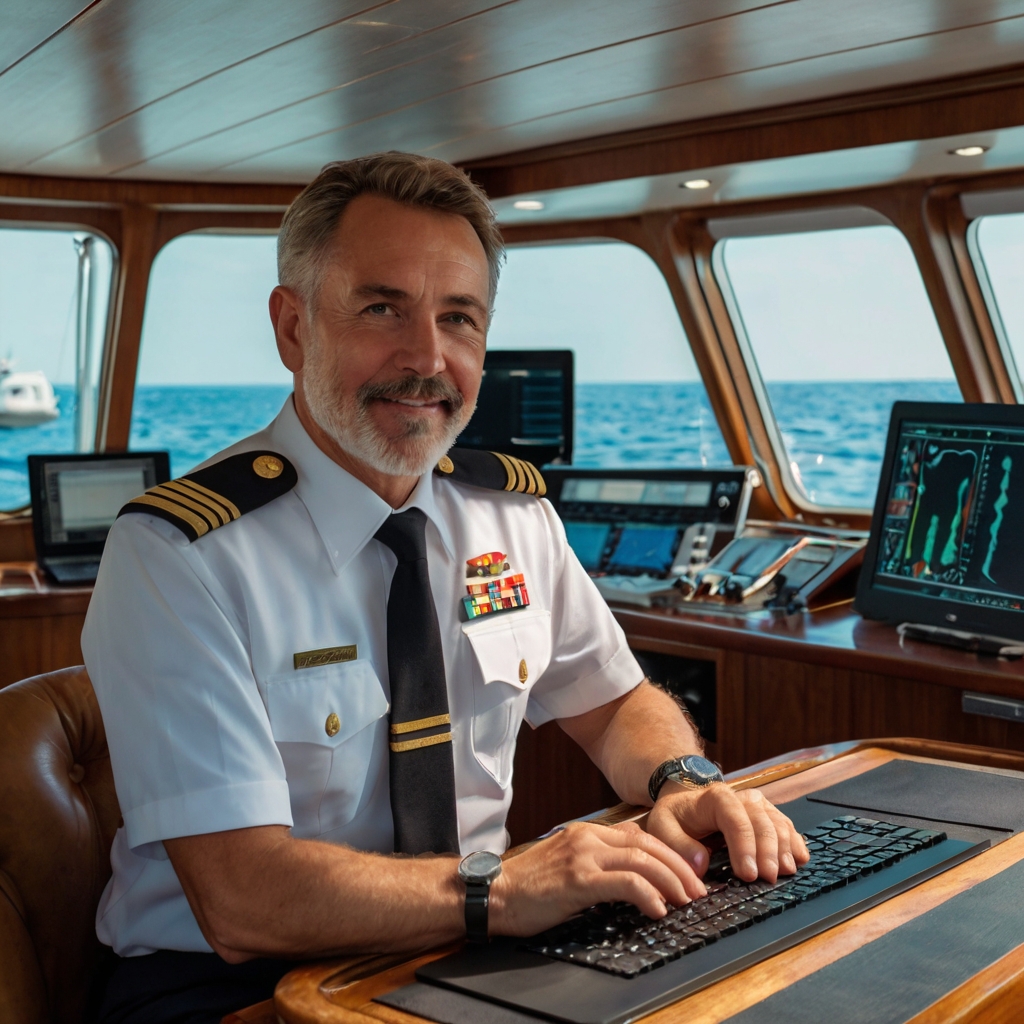
The Life of a Yacht Captain
Beyond the opulence and leisure associated with yachting, Captains of luxury yachts are keenly aware of the weighty responsibility that comes with managing such magnificent vessels. With this understanding, they approach their role with utmost seriousness, knowing that the safety and well-being of all on board rest squarely on their shoulders. Every decision made, from route planning to emergency protocols, carries significant implications, underscoring the gravity of their position.
Furthermore, captains grasp the wider significance of their responsibility, extending beyond the confines of their vessel. They are tasked with acknowledging their role as custodians of marine ecosystems and guardians of maritime safety standards. This understanding propels their dedication to maintaining stringent operational protocols and advocating for environmental conservation initiatives. Captains recognize that their decisions not only affect the immediate voyage but also play a part in the overall sustainability of marine environments.
Essentially, yacht captains recognize that the gravity of their duty transcends the allure of yachting, underlining their commitment to both passengers and the preservation of the marine ecosystem.
What Does a Yacht Captain do all day?
A typical day for a yacht captain would include coordinating a symphony of precision, leadership, and unyielding dedication.
A standard day for any professional yacht captain would begin with their morning routine, meticulously reviewing Weather Forecasts , inspecting navigational charts, and coordinating with the crew to ensure a seamless voyage ahead. Once underway, the captain’s duties would expand to encompass a myriad of responsibilities, from plotting courses and monitoring engine performance to overseeing onboard operations and maintaining constant communication with shore authorities.
With every decision made and every command issued, the captain’s expertise and experience serve as the guiding force behind the smooth operation of the vessel, instilling confidence in their crew and passengers alike.
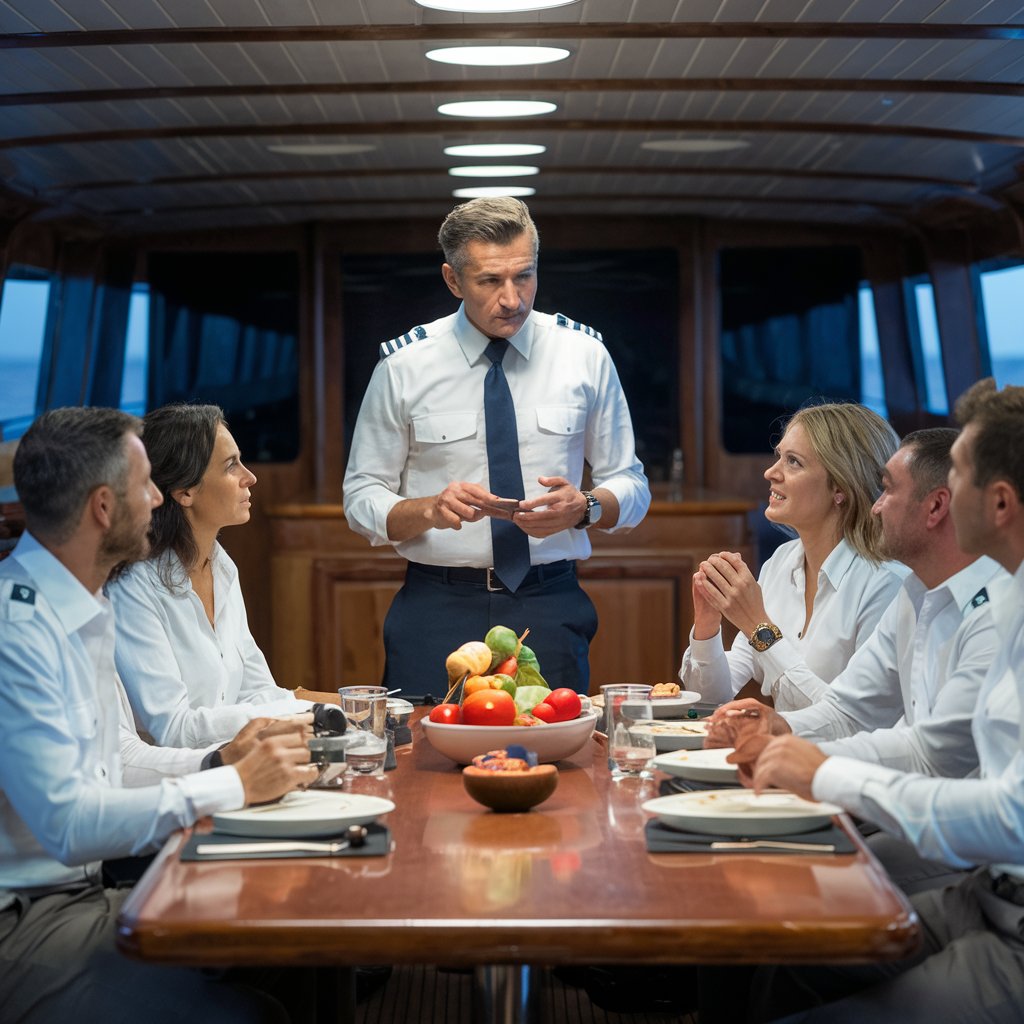
Of course this is by no means always smooth sailing without challenges. More often than not, captains may be required to exhibit adaptability and problem-solving skills at a moment’s notice as they navigate through dynamic environments and encounter unforeseen challenges. Such challenges may include sudden changes in Weather Patterns , mechanical malfunctions, or navigational hazards, but regardless the captain must remain steadfast in his resolve to ensure the safety and well-being of all onboard.
Let’s not forget that the captain is the crucial liaison who directly communicates with the Yacht Owner, Who could be very Fussy or Difficult to Deal with , ensuring that their preferences and instructions are meticulously followed and that all aspects of the voyage align with their expectations.
Moreover, beyond the technical aspects of their role, the captain also serves as the ”instrument” of leadership on the yacht, fostering a culture of collaboration and camaraderie among the crew, and inspiring confidence through their unwavering dedication to the art and science of yachting.
Responsibilities of a Super Yacht Captain
- Navigation: Plan and execute safe routes for the yacht’s voyage, considering weather conditions, navigational hazards, and other vessels in the area.
- Crew Management: Oversee the hiring, training, and scheduling of crew members, ensuring smooth operations and adherence to safety protocols.
- Safety and Security: Implement and enforce safety procedures and emergency protocols to protect passengers, crew, and the vessel itself.
- Maintenance: Supervise regular maintenance and repairs of the yacht, including mechanical systems, engines, and onboard equipment.
- Guest Services: Provide exceptional service to guests, anticipating their needs and ensuring a comfortable and enjoyable experience onboard.
- Financial Management: Manage budgets, expenses, and financial transactions related to the operation and maintenance of the yacht.
- Compliance: Ensure compliance with maritime regulations, flag state requirements, and industry standards.
- Communication: Maintain clear communication with passengers, crew, Yacht Brokers , port authorities, Yacht Agents and other stakeholders during the voyage.
- Environmental Stewardship: Promote sustainable practices and environmental conservation efforts to minimize the yacht’s impact on marine ecosystems.
- Crisis Management: Respond effectively to emergencies and crisis situations, demonstrating leadership and decisive action to mitigate risks and ensure the safety of all onboard.
When overseeing charter guests on a yacht, the captain plays a crucial role in ensuring that their experience is enjoyable, safe, and memorable, curating an unforgettable experience for charter guests, combining exceptional service, safety, and local expertise to create cherished memories aboard the yacht.
Here are some specific duties related to managing charter guests:
- Pre-Charter Planning : The captain works closely with the charter broker and the yacht owner to understand the preferences and requirements of the charter guests. This may involve coordinating special requests, such as dietary restrictions, preferred activities, or specific destinations to visit during the charter.
- Welcome and Orientation : Upon the guests’ arrival, the captain personally welcomes them aboard the yacht and provides a comprehensive orientation. This includes familiarizing them with safety procedures, emergency equipment, and the layout of the yacht. The captain also introduces the guests to key crew members and outlines the planned itinerary for the charter.
- Hospitality and Concierge Services : Throughout the charter, the captain oversees the delivery of exceptional hospitality and concierge services to the guests. This may involve arranging personalized excursions, restaurant reservations, water sports activities, or onboard entertainment. The captain ensures that all guest requests are promptly attended to and that their needs are met to the highest standards.
- Guest Safety and Security : The captain prioritizes the safety and security of charter guests at all times. This includes conducting regular safety briefings, monitoring weather conditions, and implementing safety protocols during water activities. The captain also ensures that the yacht’s security measures are in place, such as restricting access to certain areas and monitoring guest movements while in port.
- Cultural and Local Knowledge : Captains often possess valuable local knowledge about the destinations visited during the charter. They may provide insights into the History, Culture, and attractions of each location, enhancing the guests’ overall experience. The captain may also recommend off-the-beaten-path destinations or hidden gems to explore.
- Communication and Feedback : Throughout the charter, the captain maintains open communication with the guests to ensure their satisfaction and address any concerns or issues that may arise. This includes conducting regular check-ins to gauge guest feedback and preferences, as well as promptly resolving any problems to ensure a seamless charter experience.
- Privacy and Discretion : The captain respects the privacy and confidentiality of charter guests, ensuring that their personal information and activities remain confidential. This includes implementing strict confidentiality policies among the crew and discreetly managing any media or paparazzi attention that may arise, particularly for high-profile guests.
How Much Money does a Yacht Captain Make?
The salary of a yacht captain can vary significantly depending on various factors such as the size and type of the yacht, the owner’s preferences, the captain’s experience and qualifications, and the location of the vessel. Generally, salaries for yacht captains range from around $50,000 to well over $200,000 per year, with some captains commanding even higher salaries on mega yachts owned by ultra-high-net-worth individuals or charter companies. Captains of larger yachts typically earn more than those on smaller vessels, as their responsibilities and the complexity of the operations increase with the size of the yacht.
In addition to a base salary, many yacht captains receive additional compensation in the form of tips, bonuses, and benefits. Tips can be a significant source of income for captains, especially on luxury charter yachts where gratuities are customary and can amount to a substantial portion of the captain’s earnings. Some captains also receive bonuses based on performance, such as successfully completing challenging voyages, maintaining high standards of safety and service, or achieving exceptional guest satisfaction ratings.
Furthermore, yacht captains may enjoy a range of perks and benefits, including accommodations, meals, transportation, health insurance, and retirement plans, depending on the terms of their employment contract and the generosity of the yacht owner or management company. Overall, while the salary of a yacht captain can be lucrative, it ultimately depends on various factors, and compensation packages can vary widely within the industry.
What Qualifications do you Need to be a Superyacht Captain?
Becoming a superyacht captain requires a combination of education, Training, Experience, and Certifications . At a minimum, aspiring superyacht captains typically need to obtain a captain’s license issued by a recognized maritime authority, such as the Maritime and Coastguard Agency (MCA) in the UK, the United States Coast Guard (USCG) in the U.S., or the Maritime Authority in their respective country. These licenses come in different levels, ranging from basic qualifications for operating smaller vessels to advanced certifications required for commanding large superyachts. To qualify for a captain’s license, candidates must typically complete a designated amount of sea time, undergo specialized training in areas such as navigation, safety procedures, and maritime law, and pass written and practical examinations.
In addition to obtaining a captain’s license, superyacht captains often benefit from pursuing further education and training to enhance their skills and qualifications. Many captains choose to complete advanced courses and certifications offered by professional organizations such as the Professional Yachting Association (PYA) or the International Yacht Training (IYT). These programs cover a wide range of topics, including advanced navigation techniques, yacht management and operations, emergency response procedures, and leadership and communication skills.
Additionally, captains may choose to specialize in specific areas of yachting, such as sailing yachts, motor yachts, or expedition yachts, by pursuing specialized training and certifications tailored to their chosen niche. Overall, a combination of formal education, practical experience, and ongoing professional development is essential for aspiring superyacht captains to acquire the qualifications and expertise necessary to excel in this prestigious and demanding profession.
Do Captains Really Channel their ”God Mode” on a Yacht?
The term “God Mode” in the context of a yacht is not an official or standard maritime term, but it can colloquially refer to certain privileges or controls that a captain has. Here are some aspects that might be informally referred to as a captain’s “God Mode”:
- Absolute Authority : On a yacht, especially in international waters, the captain has near-absolute authority. This includes making critical decisions about navigation, safety, and the conduct of passengers and crew. This level of control can be likened to “God Mode.”
- Access to All Areas : The captain typically has unrestricted access to all parts of the yacht, including private areas that might be off-limits to other crew members and guests.
- Master Control Systems : The captain can access and control all the yacht’s systems, such as navigation, communication, engine controls, and safety systems. This comprehensive control can be considered a form of “God Mode.”
- Security Measures : The captain has the authority to enforce security measures, handle emergencies, and make decisions that override those of the yacht owner or guests if safety is at risk.
While “God Mode” is more of a tech and gaming term implying omnipotence, its application here is metaphorical, highlighting the extensive powers and responsibilities vested in a yacht captain. Of course, every captain should be cautious not to take this expression “God Mode” out of context. Humility allows captains to remain vigilant, continuously learn, and respect the unpredictable nature of the sea. By recognizing their limitations and the importance of teamwork, captains can make more prudent decisions, ensuring the safety and well-being of all aboard.
Sailing Against the Tide: The Rise of Female Captains in the Yachting Industry
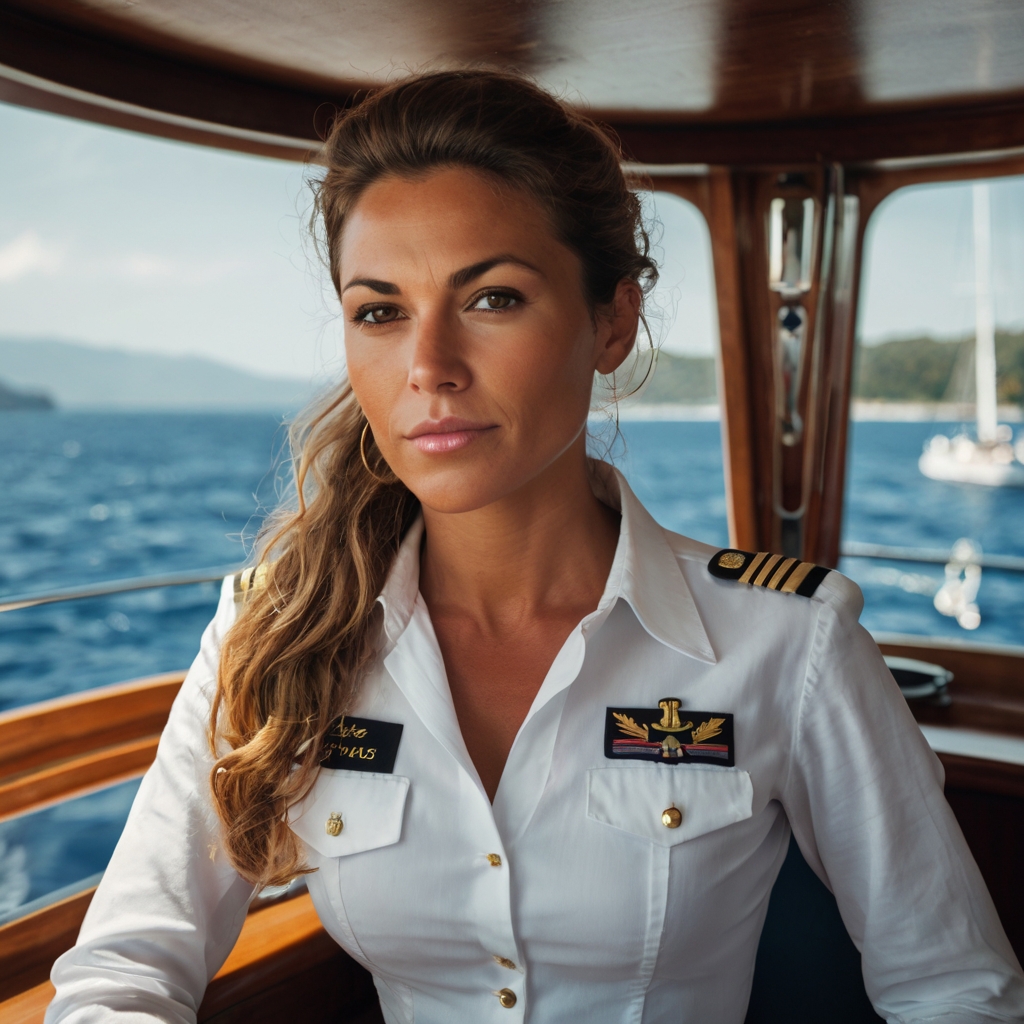
In the dynamic world of yachting, female captains have steadily carved out a significant presence, challenging traditional gender norms and reshaping the industry’s landscape. These trailblazing women bring a unique blend of skill, resilience, and passion to their roles, navigating not only the vast expanses but also the often male-dominated culture of yachting. With a keen eye for detail and a commitment to excellence, female captains command respect and admiration from crews and clients alike.
Their dedication to safety, coupled with their ability to foster a cohesive team environment, sets them apart as exemplary leaders in an industry that demands precision and poise in equal measure. Indeed, leadership knows no gender.
Beyond their exceptional seamanship, female captains in the yachting industry also serve as powerful role models, inspiring future generations of women to pursue their dreams fearlessly. Through their achievements, they dismantle stereotypes and open doors for women aspiring to excel in traditionally male-dominated fields.
Their stories of perseverance and triumph serve as real life beacons of hope. As more women take the helm and steer their way to success, the yachting industry evolves into a more inclusive and diverse community, enriched by the contributions of these fearless female leaders.
Sailing Into Sunset: Reflecting on a Captain’s Resolve
So, there we have it, a yacht captain’s life is a continuous journey of learning, leading, and navigating not just a ship, but a dynamic ever-evolving environment. Long after the engines quiet and the guests retreat, it is the captain who steers the course with steady hands and an unwavering resolve.
For all aspiring yachtees out there captivated by the allure of the open sea and the thrill of commanding a vessel, pursuing studies to become a yacht captain is a pathway ripe with promise and adventure. Embarking on this journey not only offers the opportunity to master the art of seamanship but also opens doors to a world of boundless possibilities. With dedication, training, and a thirst for knowledge, one can navigate the waves of the yachting industry, charting a course towards a fulfilling and rewarding career.
Of course, individuals may choose to embark on Diverse Career Paths Within the Maritime Sector prior to pursuing a role as captain. Some may start as deckhands, gaining firsthand experience in vessel operations and maintenance, while others may specialize in hospitality roles, honing their customer service skills onboard luxury yachts. Additionally, some may pursue certifications and licenses through maritime training programs, further augmenting their expertise in navigation, safety protocols, and maritime regulations. These varied career trajectories not only provide valuable insights into the multifaceted nature of yacht operations but also cultivate the essential skills and knowledge necessary for leadership roles at sea one day.
As the industry continues to evolve and embrace diversity, there has never been a better time to embark on this exhilarating voyage. So, set your sights on the horizon, and embark on a journey that promises excitement, challenge, and the chance to become a captain of your own destiny.
**Our Website contains affiliate links. This means if you click and make a purchase, we may receive a small commission. Don’t worry, there is no extra cost to you. It’s a simple way you can support our mission to bring you quality content**.
6 thoughts on “The Life of a Yacht Captain”
Thank you, Troy,
Your article brilliantly captures the profound dedication, expertise, and leadership required to helm a luxury yacht. The detailed exploration of a captain’s daily routine and responsibilities showcases their unwavering commitment to safety, environmental stewardship, and exceptional guest service.
Seeing the intricate balance they maintain between operational excellence and fostering a collaborative crew environment is enlightening.
This article enhances my appreciation for these skilled professionals and inspires future generations to pursue this rewarding career. Thank you, Troy, for this captivating and informative piece!
There is so much I’ve learned from your article, Troy; it has truly been an enlightening experience.
Hi Earlofpearl
Many thanks for your feedback, and I am delighted that you enjoyed the article
hello there,
A well-written and comprehensive piece that offers a detailed look into the demanding yet rewarding role of a yacht captain. It effectively highlights the significant responsibilities captains bear, from ensuring passenger safety and managing crew to environmental stewardship. The article also does a great job of detailing a captain’s daily routine, the challenges they face, and the importance of leadership. Additionally, the inclusion of the rise of female captains adds a valuable perspective on gender diversity in the industry. Overall, it’s an informative and engaging read for anyone interested in the world of luxury yachting.
Hello Gemma
Many thanks for your thoughtful feedback. I am delighted that you enjoyed the article.
This article was a fascinating read! It gave a detailed and captivating glimpse into the life of a yacht captain. I enjoyed learning about the diverse responsibilities, from navigation to ensuring the safety and comfort of everyone on board. It really highlighted the dedication and skill required for this unique profession. Thanks for sharing such an informative piece!
Many thanks for your feedback, and I am delighted that you enjoyed the article.
Leave a Comment Cancel reply
Save my name, email, and website in this browser for the next time I comment.
If you're seeing this message, it means we're having trouble loading external resources on our website.
If you're behind a web filter, please make sure that the domains *.kastatic.org and *.kasandbox.org are unblocked.
To log in and use all the features of Khan Academy, please enable JavaScript in your browser.
Course: Careers > Unit 15
Yacht captain: what i do and how much i make.
- Yacht captain: How I got my job and where I'm going
- Yacht captain: My budget and planning for the future
Want to join the conversation?
- Upvote Button navigates to signup page
- Downvote Button navigates to signup page
- Flag Button navigates to signup page
Video transcript
Dave Portnoy rescued by Coast Guard after drifting out to sea: 'Almost lost Captain Dave'
"captain dave may never go on the boat again," said portnoy..

Barstool Sports' owner and founder Dave Portnoy was rescued by the U.S. Coast Guard after losing control of his boat off the Massachusetts' coast.
"You boys almost lost Captain Dave today," said Portnoy in a TikTok video he posted explaining what happened. "Captain Dave almost was lost to the ocean."
On Monday, Portnoy took his mother out on a boat ride off the coast of Nantucket, he said. Portnoy did not try to turn on the boat before unhooking it from the from the buoys. He drifted out and attempted to turn on the boat only to find that the boat had no power.
Content warning: Video below contains language that is not suitable for all audiences .
The boat had no power, radio or anchor and there were heavy winds which caused him to drift out to sea, Portnoy explained.
"Next thing you know, Captain Dave is lost at sea," said Portnoy.
The Barstool founder began screaming for help as he sailed, and shot a distress signal from a flare gun he kept onboard the boat.
Coast Guard rescues Portnoy
According to Portnoy, a woman "in what looks like a rowboat," boarded his boat and asked if they can make a TikTok together, said Portnoy. He declined her request and then used her radio to contact the Coast Guard.
The Coast Guard made it to Portnoy's location where they tied up his boat and towed it back.
This was Portnoy's third, and possibly last time captaining a boat.
"Captain Dave may never go on the boat again," he said.
USA TODAY reached out to the Coast Guard for comment.
Julia is a trending reporter for USA TODAY. She has covered various topics, from local businesses and government in her hometown, Miami, to tech and pop culture. You can reach her at [email protected], connect with her on LinkedIn or follow her on X, formerly Twitter , Instagram and TikTok : @juliamariegz
- Share full article
Advertisement
How to Charter a Boat
If you want to sail off into the sunset, at least temporarily, you need to understand how to get aboard first.

By Lauren Sloss
This time of year, it’s an inevitable thought: Life would be that much better out on the water. Specifically, on a boat.
Even if you have neither a boat nor boating experience, it’s never been easier to make your nautical dreams come true — whether you want a day trip on your local lake or a fully staffed multiday voyage in a far-flung locale. Here are the initial questions that will help you plan an adventure on the water.
Whom are you traveling with?
Thinking about the size and dynamic of your group is an important first step, even if you are simply going on a day trip. Will children be on board? How old? What about elderly parents?
Dan Lockyer, the chief commercial officer of Dream Yacht Worldwide , strongly encourages travelers to determine group size — and, ideally, get people committed — before booking.
“The location that you want to go to, the time of year that you want to go, the type of boat that you want will entirely depend on the makeup of the group that you’re sailing with,” Mr. Lockyer said.
Do you want to captain, or do you want a captain?
Different charter companies specialize in certain locations, types of boats, itineraries and services. Some companies offer the opportunity for a “bareboat” charter, in which you rent the boat and take on the navigation and provisioning yourself, while others exclusively offer fully staffed options, including a captain and a cook.
If you want to captain the boat yourself, almost all outfits require some kind of proof of sailing or boating experience, often in line with local regulations.
Edward King, 45, an executive at a streaming company based in San Francisco, is experienced in sailing the city’s waterways. But on vacation, he said he would prefer to let a captain and crew take the lead.
Mr. King said he appreciates a captain who is familiar with both the local waters — “they’ll know how to avoid sailing into a certain sandbar,” he said, — as well as the local attractions.
In contrast, Matt Blake, 38, a software engineer based in Oakland, Calif., was eager to grow his sailing experience during a recent trip to La Paz, Mexico, with his fiancée. He hired a captain but made clear that the captain was there to help and teach.
Where do you want to go?
“Do you want something that’s more culturally oriented? Nature oriented? An adventure trip?” asked Mary Curry, the voyage product director of Adventure Life , which offers small group tours and private trips on land and on water around the world.
That answer can determine your destination. Popular cruising grounds include the Caribbean, Croatia, Alaska and French Polynesia, but the sky — or the sea — is really the limit. For help narrowing your focus, travel advisers often have relationships with charter companies or outfits around the world, and sailing publications offer recommendations.
Kyla Malkani, who has had experience with charters working as a destination wedding planner, recommends consulting the concierge of waterfront hotels, particularly for short-term or day rentals.
“A lot of times they will have either their own fleet or they will have some sort of connection at a dock,” said Ms. Malkani, 37, who is based in Washington, D.C., and is currently working as a content creator and freelance event planner.
What kind of boat?
Where you want to travel and for how long will likely determine the kinds of boats that are available to you. Crucial at this point, too, is an understanding of the boat’s layout and amenities.
“You definitely want to choose the right kind of boat,” said Ms. Malkani. “If you want more adventure, a sailboat is nice. If you’re looking for a luxury party environment, a yacht is best. And if you’re looking for something smooth, for older people or with kids, a catamaran is great.”
David Barclay is a luxury travel adviser who has also chartered boats for his own vacations.
“You want to match what the travelers want to what the boat offers,” he said.
Perhaps a group of friends might not mind a catamaran with functional but not luxurious marine bathrooms, but a multigenerational group might prefer more high-touch amenities.
When should I book?
Often, charter trips are once-in-a-lifetime experiences that require a great deal of advanced planning.
“You may have a specific place you want to go, or a specific time of year you want to travel,” said Mr. Barclay. “And some places just aren’t good at certain times of year.”
Naturally, you don’t want to be at sea in the Caribbean during hurricane season, or in the Mediterranean during winter storms. But you also might want to avoid peak cruising seasons, too.
The first three weeks of August are quite popular, said Mr. Lockyer. “If you have some flexibility and can travel in early July, you’ll get the same sort of great weather, a greater selection of boats and the anchorages won’t be as crowded.”
How much does it cost?
Charter costs are incredibly variable, dependent on all of the factors coming into play: your boat type and size, your destination, your group size, the amount of crew you’d like and the amenities on board. That said, costs could range anywhere from $2,000 for a day on a sailboat to hundreds of thousands of dollars for a multiday mega-yacht charter. Have a budget in mind when beginning your research process.
What if I didn’t plan far in advance?
While advanced planning is encouraged, and often necessary for bigger boat trips, it’s possible to book a boat last-minute.
Boatsetter , an Airbnb-like platform for boats, is a good resource for last-minute bookings, especially for day trips, and even has an Instant Book option for down-to-the-wire bookings.
“If it’s for a special event, or around major holidays, you may want to book a month or two in advance. But for general bookings, you can find options within a week or two,” said Kim Koditek, Boatsetter’s head of brand strategy and communications, of the company’s overnight offerings, which appear on their platform under the luxury yacht charters category .
Ms. Malkani has used Boatsetter for some of her charters, most of which have been booked with a specific goal in mind.
“I’m a sunset chaser,” she said. “My husband and I just really love being on the water, and we always try to squeeze in some sort of boat day activity when we’re traveling.”
For more travel advice, visit our collection of Travel 101 tips and hacks.
Come Sail Away
Love them or hate them, cruises can provide a unique perspective on travel..
Cruise Ship Surprises: Here are five unexpected features on ships , some of which you hopefully won’t discover on your own.
Icon of the Seas: Our reporter joined thousands of passengers on the inaugural sailing of Royal Caribbean’s Icon of the Seas . The most surprising thing she found? Some actual peace and quiet .
Th ree-Year Cruise, Unraveled: The Life at Sea cruise was supposed to be the ultimate bucket-list experience : 382 port calls over 1,095 days. Here’s why those who signed up are seeking fraud charges instead.
TikTok’s Favorite New ‘Reality Show’: People on social media have turned the unwitting passengers of a nine-month world cruise into “cast members” overnight.
Dipping Their Toes: Younger generations of travelers are venturing onto ships for the first time . Many are saving money.
Cult Cruisers: These devoted cruise fanatics, most of them retirees, have one main goal: to almost never touch dry land .
trending now in Entertainment

Jennifer Lopez was 'drama all the time,' leading to Ben Affleck...

Britney Spears tells ‘boring’ Osbourne family to ‘f–k...

Inside Tom Brady's low-key night out with son Jack, 16, at NYC...

Mauricio Umansky packs on PDA with mystery woman in Mykonos after...

Jennifer Lopez spends Ben Affleck wedding anniversary driving...

Maren Morris reacts to viral wardrobe malfunction: 'Did anything...

Katie Maloney eviscerates Tom Sandoval for suing Ariana Madix

Angelina Jolie asks Brad Pitt to 'end the fighting' and drop his...
Dave portnoy rescued by coast guard after making ‘critical mistake’ on boat: i was nearly ‘lost at sea’.
- View Author Archive
- Follow on X
- Get author RSS feed
Thanks for contacting us. We've received your submission.
Dave Portnoy had to be rescued by the US Coast Guard on Monday after he and his boat were “nearly lost” at sea.
“Your boys almost lost Captain Dave today. Captain Dave almost was lost to the ocean, mother ocean,” the Barstool Sports founder, 47, revealed in a video shared via X .
Portnoy went on to explain that he was planning to take his mom, Linda, out for a boat ride off Nantucket as she was in town visiting him at this home in Massachusetts.
However, when Portnoy unhooked the 28-foot vessel from the dock and buoys, he realized he made a “critical mistake” as the boat had “no power, no radio, no anchor, no nothing” amid “heavy, heavy winds.”

“Next thing you know, Captain Dave is lost at sea,” he recalled. “[The boat’s] just blowing, [I’m] trying not to crash into ships in the harbor.”
Portnoy said he started screaming for help and also used a flare gun to send a stress signal. Luckily, a woman in a “rowboat” saw him and made her way over to him to assist.
“She boards Captain Dave’s vessel, says, ‘Can I make a TikTok of you, Captain Dave?’ I said, ’No time for TikToks.’ She goes, ‘Well, I don’t have my phone on me anyways,’” he remembered. “[But] her radio works [and she] calls in the Coast Guard.”

Want more celebrity and pop culture news?
Start your day with Page Six Daily.
Thanks for signing up!
Please provide a valid email address.
By clicking above you agree to the Terms of Use and Privacy Policy .
Want celebrity news as it breaks? Hooked on Housewives?
Portnoy said that four “burly dudes” from the US Coast Guard arrived shortly after the call was made.
“Captain Dave is out at sea going back and forth, rocking, thinks my life is over. Captain Dave had to be halfway to f–king the Caribbean just rocking, no power, no boat,” he shared.
“Thankfully, Coast Guard, God bless her soul, tied me up, brings me back to my [dock]. Dave lives to tell another tale.”

Portnoy admitted that the ordeal definitely took a toll on him but is thankful to the US Coast Guard for “saving” his life.
He called boating “a dangerous game” and told fans that he “may never go on the boat again” following the stressful incident.
The US Coast Guard Northeast X account later reposted his video, adding, “You’re welcome, Dave. Tell [your dog] Miss Peaches we said hi and remember to boat safe! #SemperParatus.”

As previously reported, the internet personality has spent his summers in the idyllic vacation town for years before purchasing a whopping $42 million mansion last year .
The incident marked the second time this summer that Portnoy has had a scare, since he recently revealed that he had a mole removed from his neck after discovering he had skin cancer .
“So it was a mole. I’m starting to get on top of myself so I went to a doctor, did the skin thing and they scrape it and one of them came back as, like, cancerous, so it’s like, ‘Boop, gotta take it out,’” he said last month during one of his podcast episodes.

Advertisement

Why Dave Portnoy Had to Be Rescued By the Coast Guard
Barstool Sports founder Dave Portnoy had a scary mishap in the sea while attempting to take his mom on a boat ride in Nantucket.
Recalling the misadventure to his followers on Monday, July 15, "Captain Dave" — as the shirtless Portnoy refers to himself throughout the two-minute video — let fans know that they "almost lost" him in the incident.
"Captain Dave was almost lost to the ocean. Mother ocean," Portnoy, clad in a captain's hat, explained on the beach as the wind whipped around him.
He started out the story by explaining that he went out to the boat at his mom's request, only to find out that the engine was dead. Noting that it was only his "third time out" as captain, Portnoy admittedly "made a mistake" when unhooking himself from the buoy to check out the boat's power situation.
"No power, no radio, no anchor, no nothing. Heavy, heavy winds. Next thing you know, Captain Dave is lost at sea," he revealed. "Just blowing. Trying not to crash into any ships in the harbor. Just heading out to the channel. … And Captain Dave doesn't know what he's gonna do."
Despite not being "any type of firework guy," Portnoy utilizes the "flare gun thing … [and] shoots his f***ng [flare] gun into the sky as a distress single."
As Portnoy is shouting, "'Help! Captain Dave needs help!'" he recalled, laughing, a woman in "what looked like a rowboat" came by to save him — though she initially asked to film the whole thing for TikTok .
"'There's no time for TikTok,'" Portnoy responded, which was just as good considering the woman didn't have a phone on her, anyway.
Fortunately, the woman contacts the Coast Guard on her radio. When the Coast Guard arrives — "four burly dudes," Portnoy described — the social media personality thought he had been "halfway to the f***ing Caribbean" by how far he had floated out to see.
"Thankfully, Coast Guard, God bless their soul, tied me up, [brought] me back … Captain Dave lives to tell another tale."
"The sea's angry, my friends," Portnoy told his followers. "Captain Dave may never go on the boat again."
Start your unlimited Newsweek trial

latest in US News

Trump’s would-be assassin Thomas Crooks wrote chilling online...

MSNBC's Joy Reid compares 'elderly' Biden's potential COVID...

Mom of American teacher imprisoned in Russia said Trump vowed to...

CNN's Van Jones highlights 'strength vs. weakness' after Trump...

Biden insists he's 'in better physical shape' than Trump as he...

JD Vance's RNC speech shows Trump's Republican Party stands for...

Nancy Pelosi privately told Biden he can't beat Trump in 2024...

J.D. Vance delivers soul-stirring first remarks as Trump's VP
Breaking news, dave portnoy rescued by coast guard after boat goes adrift off nantucket: ‘we almost lost captain dave’.
- View Author Archive
- Get author RSS feed
Thanks for contacting us. We've received your submission.
Barstool Sports founder Dave Portnoy and his mom had to be rescued by the US Coast Guard Monday after his boat suddenly lost power and went adrift off Nantucket.
“Your boys almost lost Captain Dave today,” the 47-year-old revealed in a video posted on social media.
The sea saga unfolded after Portnoy said he unhooked his 28-foot boat from a dock in one of the exclusive Massachusetts vacation island’s harbors — only to realize the vessel’s engine and breakers were dead.

“No power, no radio, no anchor, no nothing; heavy, heavy winds,” he recalled in the two-minute clip. “Next thing you know, Captain Dave is lost at sea.”
After trying to navigate his boat through the crowded harbor, Portnoy — who last year shelled out a staggering $42 million for a waterfront property on the island — said he screamed for help and eventually fired a flare gun to attract attention.
Eventually, a female who was sailing nearby noticed him and boarded his boat.
“She boards Captain Dave’s vessel. She said, ‘Can I make a TikTok of you?’ I said, ‘No time for TikToks,'” he said.

The woman then radioed the Coast Guard for help, Portnoy revealed.
Coast Guard members who were conducting a training exercise nearby helped tow his boat back to land.
“Captain Dave lives to tell another tale,” Portnoy said as he thanked the agency.
The Boston-based First Coast Guard District later responded to Portnoy’s video, tweeting : “You’re welcome, Dave.”
“Tell Miss Peaches we said hi and remember to boat safe!” the agency added, referring to Portnoy’s 6-year-old American pit bull rescue.
Meanwhile, Portnoy claimed he may have second thoughts about going back out on his boat again.
“It’s a dangerous game, the sea’s angry, my friends,” he said. “Captain Dave may never go in the boat again.”

Advertisement
- Subscribe Now (Opens in new window)
- Air Force Times (Opens in new window)
- Army Times (Opens in new window)
- Marine Corps Times (Opens in new window)
- Pentagon & Congress
- Defense News (Opens in new window)
- Flashpoints
- Benefits Guide (Opens in new window)
- Military Pay Center
- Military Retirement
- Military Benefits
- VA Loan Center (Opens in new window)
- Discount Depot
- GearScout (Opens in new window)
- Military Culture
- Military Fitness
- Military Movies & Video Games
- Military Sports
- Transition Guide (Opens in new window)
- Pay It Forward (Opens in new window)
- Military History
- Black Military History (Opens in new window)
- Congressional Veterans Caucus (Opens in new window)
- Military Appreciation Month (Opens in new window)
- Vietnam Vets & Rolling Thunder (Opens in new window)
- Hall of Valor (Opens in new window)
- Service Members of the Year (Opens in new window)
- Create an Obituary (Opens in new window)
- Medals & Misfires
- Installation Guide (Opens in new window)
- Battle Bracket
- CFC Givers Guide
- Task Force Violent
- Newsletters (Opens in new window)
- Early Bird Brief
- Photo Galleries
- Long-Term Care Partners
- Navy Federal
- Digital Edition (Opens in new window)
Coast Guard rescues Barstool Sports’ Captain Dave Portnoy
The Coast Guard rescued Barstool Sports’ founder Dave Portnoy after an incident off Nantucket, Massachusetts, the sports and pop culture company leader shared Monday on his social media.
“Captain Dave almost was lost to the ocean, mother ocean,” he said in the video. “No power, no radio, no anchor, no nothing. Heavy, heavy winds. Next thing you know, Captain Dave is lost at sea.”
The social media personality and new media baron, donning a captain’s hat on a beach near the water, recounted how the events unfolded.
The Coast Guard confirmed to WBZ-TV that the vessel owned by Portnoy “broke free of its mooring in Nantucket Harbor and was drifting through the area,” adding that Coast Guard members on a training exercise were able to tow the boat back to land.
Trying to not crash into other ships, Portnoy said he shot a distress flare into the sky to get attention before another boater reached him and used their radio to call for assistance.
“We are glad that he used distressed signals and applaud the Good Samaritan for having a VHF radio ready to hail the Coast Guard,” the Coast Guard told the outlet.
Portnoy quipped that he may not ever go on a boat again.
In May, the U.S. Coast Guard released its 2023 calendar year statistics on recreational boating incidents, reporting a decrease in fatalities and incidents.
The Coast Guard First District did not immediately respond to an email request for comment.
Jonathan is a staff writer and editor of the Early Bird Brief newsletter for Military Times. Follow him on Twitter @lehrfeld_media
In Other News
Family of aircraft carrier sailor who died by suicide files lawsuit
Master-at-arms seaman recruit xavier mitchell-sandor is one of at least three sailors that died by suicide aboard the carrier in april 2022..
Sailors can now wear regular clothes when they eat in shore galleys
Sailors may wear most civilian clothes to shore galleys if the sailor is in a non-duty status under a new navy policy..
With Trump pick, JD Vance is first post-9/11 vet on major party ticket
Vance is the first veteran of the enlisted ranks to run on a major-party ticket since al gore in 2000..
After attempted Trump assassination, veteran groups urge calm
Vets groups united monday to remind americans that they all share a duty in “lowering the temperature” of today’s political discourse..
USS Eisenhower back in Norfolk following historic, extended deployment
While underway, the ike carrier and its strike group shot down a barrage of iran-backed houthi drones and missiles on a regular basis..
- Election 2024
- Entertainment
- Photography
- AP Buyline Personal Finance
- AP Buyline Shopping
- Press Releases
- Israel-Hamas War
- Russia-Ukraine War
- Global elections
- Asia Pacific
- Latin America
- Middle East
- Election Results
- Delegate Tracker
- AP & Elections
- Auto Racing
- 2024 Paris Olympic Games
- Movie reviews
- Book reviews
- Financial Markets
- Business Highlights
- Financial wellness
- Artificial Intelligence
- Social Media
Judge hears arguments for restitution to families of 34 people killed in 2019 scuba boat fire
FILE - A photo collage of the victims of the Sept. 2, 2019 fire aboard the dive boat Conception, at Santa Cruz Island, is held by a family member at federal court in Los Angeles, Oct. 25, 2023. Prosecutors are seeking restitution for the families of the 34 people killed in the fire that was the deadliest maritime disaster in recent U.S. history. A judge will determine the amount on Thursday, July 11, 2024, during a hearing in federal court in Los Angeles. (AP Photo/Damian Dovarganes, File)
FILE - Defendant Jerry Boylan, captain of the dive boat, Conception, leaves federal court in Los Angeles, May 2, 2024. Prosecutors are seeking restitution for the families of 34 people killed in the boat fire in 2019 off the California coast. A judge will determine the amount on Thursday, July 11, during a hearing in federal court in Los Angeles. Boylan’s criminal negligence as the captain of the boat led to the deadliest maritime disaster in recent U.S. history. (AP Photo/Richard Vogel, File)
- Copy Link copied
LOS ANGELES (AP) — A federal judge heard arguments Thursday over whether a boat captain should pay restitution to the families of 34 people killed in a California scuba dive boat fire in 2019, with prosecutors seeking reimbursement for funeral expenses and more.
Jerry Boylan, the captain of the Conception, was convicted last year of one count of misconduct or neglect of ship officer following a 10-day trial in federal court in downtown Los Angeles. The charge was a pre-Civil War statute colloquially known as seaman’s manslaughter that was designed to hold steamboat captains and crew responsible for maritime disasters.
Boylan, who was sentenced to four years in prison and three years of supervised release, was also ordered to pay restitution for what was the deadliest maritime disaster in recent U.S. history.
During a hearing Thursday in Los Angeles federal court, however, his attorney attempted to argue that restitution should not be paid because it had not been established that the loss of life was a direct result of Boylan’s actions the night of the fire.
Federal judge George Wu disagreed, saying it was “clearly shown that the defendant did not meet the safety regulation” of having an overnight roving patrol that could have caught the fire, a fact that was already established during Boylan’s criminal trial.
Boylan’s attorney, Gabriela Rivera, also argued that only specific expenses such as funeral costs should be eligible for restitution and should have documentation such as an invoice. She added that Boylan had no significant assets and would not be able to pay restitution, saying he is living off Social Security payments and has a negative cash flow from his bank account.
“He doesn’t have any family,” Rivera said. “He has no meaningful job prospects.”
Prosecutors disagreed, arguing that Boylan in fact had assets totaling six figures and that paying restitution would mean if he ever came into money in the future, he would have to pay the victims.
Kathi Mcllvain, whose son Charles died aboard the Conception, said it was “heartbreaking” to hear the lawyers argue over line-item costs. She and her husband Clark held each other during the hearing and shook their heads as the attorneys went back and forth.
“To nitpick over $700,” said Mcllvain, referring to one amount the defense disputed in their argument. “There’s no price you can put on someone’s life.”
Even if Boylan could not pay restitution now, “at least it should be on the record that he owes that, if he ever does come into money. He shouldn’t have killed 34 people. Then he would have been able to make a living,” Mcllvain said.
McIlvain found it distressing that Boylan was only sentenced to four years and would likely not serve it until his appeal, which could take years.
“Our son’s life was worth a lot more than that,” she said.
The judge said he will have a final decision on restitution amounts at the next hearing July 29.
Boylan is currently out on bond and must report to the Bureau of Prisons by Aug. 8. He was present at Thursday’s hearing but did not speak.
Thursday’s proceeding came nearly five years after the Sept. 2, 2019, tragedy off the central California coast, which prompted changes to maritime regulations, congressional reform and several ongoing civil lawsuits.
The Conception was anchored off Santa Cruz Island, 25 miles (40 kilometers) south of Santa Barbara, when it caught fire before dawn on the final day of a three-day excursion, sinking less than 100 feet (30 meters) from shore.
Thirty-three passengers and a crew member perished, trapped in a bunkroom below deck. Among the dead were the deckhand, who had landed her dream job ; an environmental scientist who did research in Antarctica; a globe-trotting couple; a Singaporean data scientist; and a family of three sisters, their father and his wife.
Boylan was the first to abandon ship and jump overboard. Four crew members who joined him also survived.
Although the exact cause of the blaze remains undetermined, prosecutors blamed Boylan for failing to post the required roving night watch and never properly trained his crew in firefighting. The lack of the roving watch meant the fire was able to spread undetected across the 75-foot (23-meter) boat.
But Boylan’s federal public defenders sought to pin blame on boat owner Glen Fritzler , who with his wife owns Truth Aquatics Inc., which operated the Conception and two other scuba dive boats, often around the Channel Islands.
They argued that Fritzler was responsible for failing to train the crew in firefighting and other safety measures, as well as creating a lax seafaring culture they called “the Fritzler way,” in which no captain who worked for him posted a roving watch.
The Fritzlers have not spoken publicly about the tragedy since an interview with a local TV station a few days after the fire. Their attorneys have never responded to requests for comment from The Associated Press, including on Thursday.
Three days after the fire, Truth Aquatics filed suit under a pre-Civil War provision of maritime law that allows it to limit its liability to the value of the remains of the boat, which was a total loss. The time-tested legal maneuver has been successfully employed by the owners of the Titanic and other vessels and requires the Fritzlers to show they were not at fault.
That case is pending, as well as others filed by victims’ families against the Coast Guard for what they allege was lax enforcement of the roving watch requirement.

IMAGES
VIDEO
COMMENTS
Learn what it takes to be a yacht captain, from licenses and experience to personality and skills. Find out what owners and crew agents look for in a captain and how to get a job on a superyacht.
Learn about the role, responsibilities, skills and salary of a yacht captain. A yacht captain is a leader who ensures the safety, satisfaction and compliance of passengers, crew and vessel.
Yacht Captain. Sanibel Harbour Marriott Resort and Spa. Fort Myers, FL 33908. Pay information not provided. Part-time. Easily apply. Monitors and helps in the preparation of the yacht, vessel traffic, and positioning of vessels. The Captain would be also responsible for preparing the yacht…. Posted 7 days ago·.
Learn about the role, responsibilities and skills of a yacht captain, the most senior position onboard a superyacht. Find out how to get qualified, certified and connected with yacht recruiters at YPI CREW.
Captain. 100 ft - 170 ft. $84,000 - $180,000. Junior Captain. 60 ft - 100 ft. $48,000 - $98,000. Additional parts of the salary package include bonuses, health insurance, flight expenses, paid vacation, training and certification cost reimbursement, and uniforms.
Yacht Captain Job Description. The Yacht Captain is responsible for the total operation of the yacht. The position ranges from being in charge of a full-time staff of one to being the CEO of a large operation with many departments, personnel, and a large budget. The Yacht Captain is the navigator, and as such is responsible for the safety of ...
Roles and Responsibilities of a Yacht Captain. The job of a Yacht Captain can be compared to that of a CEO, CFO, and COO of a large corporation. The responsibilities are huge. On a smaller vessel of 35m or less, the captain will need to be more hands-on, and they will likely also be the engineer of the vessel.
Yacht captain salary. The salary of a yacht captain depends on several factors, including the years of experience, the size of the vessel, and the duration of the contract. Generally speaking, the low end of the salary is approximately $5000 per month and the high end exceeds $18.000 per month. For more information, check this resource.
The top of the hierarchy on each yacht is the Captain, who reports to the yacht owner either directly, or through a representative or a yacht management company. Salaries vary and depend on the yacht size, use, type and location, as well as the experience and qualification of the crew member. We included typical salaries of crew based on the ...
YACHT CAPTAIN SALARIES. Captain salaries do vary, depending on the level of experience as well as the size and type of yacht they are working on. Larger yachts tend to offer higher salaries, reaching an average of €18,000 per month on vessels between 81 and 100 meters. Captains of smaller motor and sailing yachts, ranging between 41 and 50 ...
The average monthly tips earned by captains on yachts available for charter in this range was $1,374. Yachts Between 100ft and 139ft. Captains working aboard vessels from 100- to 139-feet may expect to earn an average of $10,108.18 per month, with a range of $$1,725 to $20,000 per month, according to Salary Survey data.
Survey data shows that between 180 feet and 240 feet, yacht captains had an average salary of just over $16,100 per month in 2021. That means a starting, low end salary of $9,200 per month which went all the way up to $23,250 per month. Tips closed in at just under $3,700 per month as well. From 240 to 280 feet a yacht captain averaged just ...
Mariners provides flexible and convenient boat captain course training so you can learn on your schedule, not ours. Take your final licensing exam online and on-demand. Start with our OUPV/Six-Pack License for up to 6 passengers, or if captaining a large vessel, check out our 25/50 or 100-Ton Masters. ...
Ken has over 1 million miles on the water. He is currently in charge of a 136' Horizon Yacht that was sold in 2020 by United Yacht Sales broker Greg Graham. One advantage of working with a professional yacht broker is the referral of a reputable captain that broker knows and trusts. Known for being very thorough and detail-oriented, Captain Ken ...
This story has been excerpted from "Superyacht Captain, Life and Leadership in the World's Most Incredible Industry". It is available on Amazon and everywhere books are sold. This article originally appeared in the April 2023 issue of Power & Motoryacht magazine. Commanding a yacht worth more than a skyscraper is a special kind of heaven ...
The simple answer, says Gordon, is no - and in fact the role of a modern yacht captain is highly complex and multifaceted. Take Gordon's current command, for example - a 33-metre private yacht that cruises extensively with the owning family on board. "My responsibilities of course encompass safely operating and navigating the boat ...
Almost 300 Captains responded across a range of yacht sizes from sub-30m to 100m+. In addition to average pay and leave, pay rise and bonus activity, the 20+ page report also compares Captain and Chief Officer experience, ticket level, longevity onboard and comparisons to our 2020 and 2022 survey findings.
Becoming a boat captain can be an unexpected but rewarding career. It involves gaining a captain's license, building sea days, and learning on the job. Despite challenges, it offers travel, adventure, and a unique lifestyle. However, transitioning out can be tough, so planning is key. Questions Tips & Thanks.
2. Spend additional time training on a boat. Even though you only need 360 days of sea-time to get your license, if you want an actual job as a captain, you will usually need at least three to four years of professional experience. This experience should be directly related to the operations and management of a ship.
The captain of a yacht typically makes between $60,000 and $150,000, depending on the size of the yacht and his/her experience. On top of that, charter yacht captains will typically earn 10-15% of the price of the charter from tipping. Here's everything you need to know about how much a yacht captain makes. Table of Contents.
The Life of a Yacht Captain. May 12, 2024 by Troy Blanchard. Beyond the opulence and leisure associated with yachting, Captains of luxury yachts are keenly aware of the weighty responsibility that comes with managing such magnificent vessels. With this understanding, they approach their role with utmost seriousness, knowing that the safety and ...
Connor started the company in 2001, after spending nine years at sea as a professional yacht captain. If there's a recruitment strategy to avoid, says Connor, it's hiring the first referral from a well-meaning friend. While recommendations from trusted sources are helpful, "there are times when it can feel like trying to fit a square peg ...
Yacht captain Chris McGinley shares his exciting life at sea, earning $72,000 a year. His job involves sailing, researching destinations, maintaining the boat, and managing budgets. Despite the challenges of not having a personal schedule and being away from family, Chris loves experiencing different cultures and working with local communities.
The boat had no power, radio or anchor and there were heavy winds which caused him to drift out to sea, Portnoy explained. "Next thing you know, Captain Dave is lost at sea," said Portnoy.
If you want to captain the boat yourself, almost all outfits require some kind of proof of sailing or boating experience, often in line with local regulations. Edward King, 45, an executive at a ...
Dave Portnoy had to be rescued by the US Coast Guard on Monday after he and his boat were "nearly lost" at sea. "Your boys almost lost Captain Dave today. Captain Dave almost was lost to the ...
Mother ocean," Portnoy, clad in a captain's hat, explained on the beach as the wind whipped around him. He started out the story by explaining that he went out to the boat at his mom's request ...
Barstool Sports founder Dave Portnoy and his mom had to be rescued by the US Coast Guard Monday after his boat suddenly lost power and went adrift off Nantucket. "Your boys almost lost Captain ...
"Captain Dave almost was lost to the ocean, mother ocean," he said in the video. "No power, no radio, no anchor, no nothing. Heavy, heavy winds. Next thing you know, Captain Dave is lost at ...
Prosecutors are seeking restitution for the families of 34 people killed in the boat fire in 2019 off the California coast. A judge will determine the amount on Thursday, July 11, during a hearing in federal court in Los Angeles. Boylan's criminal negligence as the captain of the boat led to the deadliest maritime disaster in recent U.S. history.